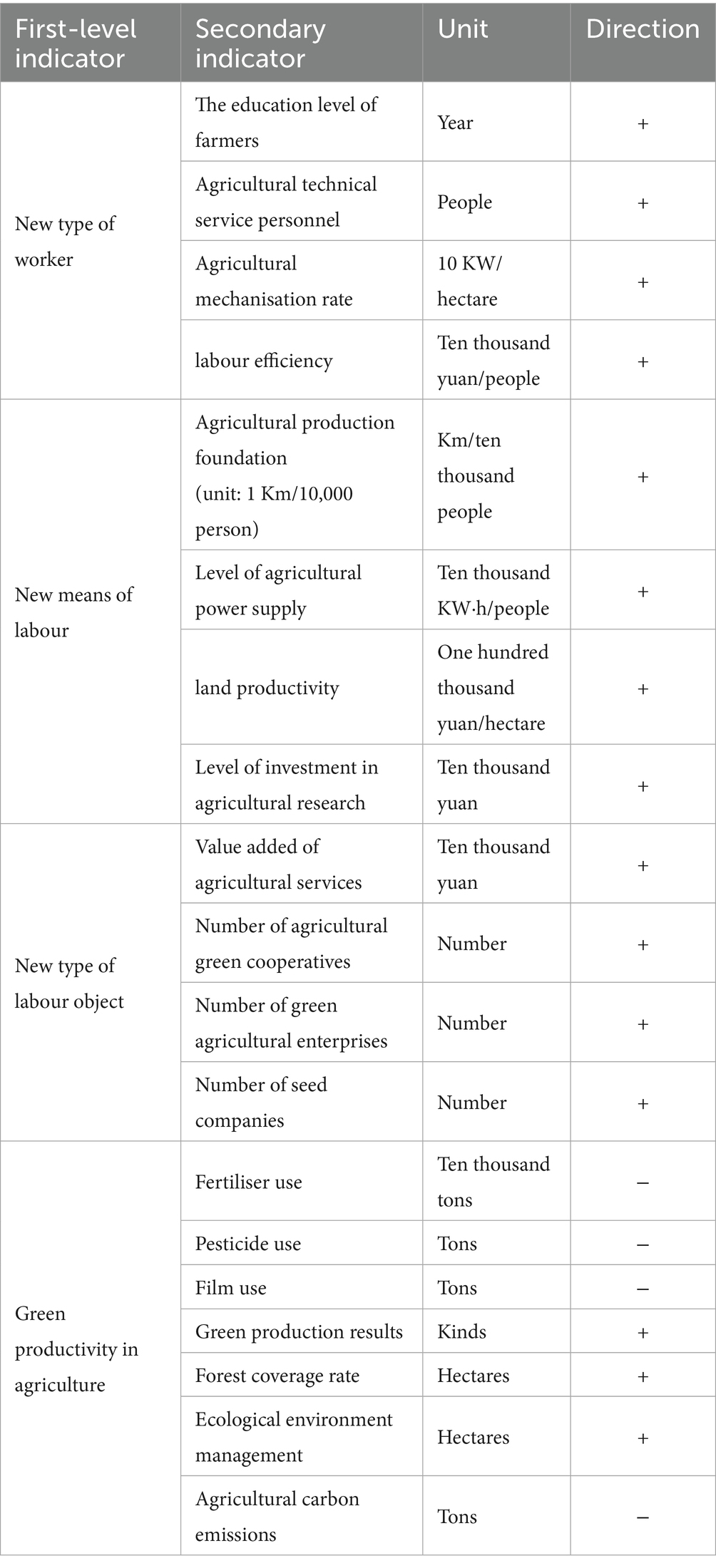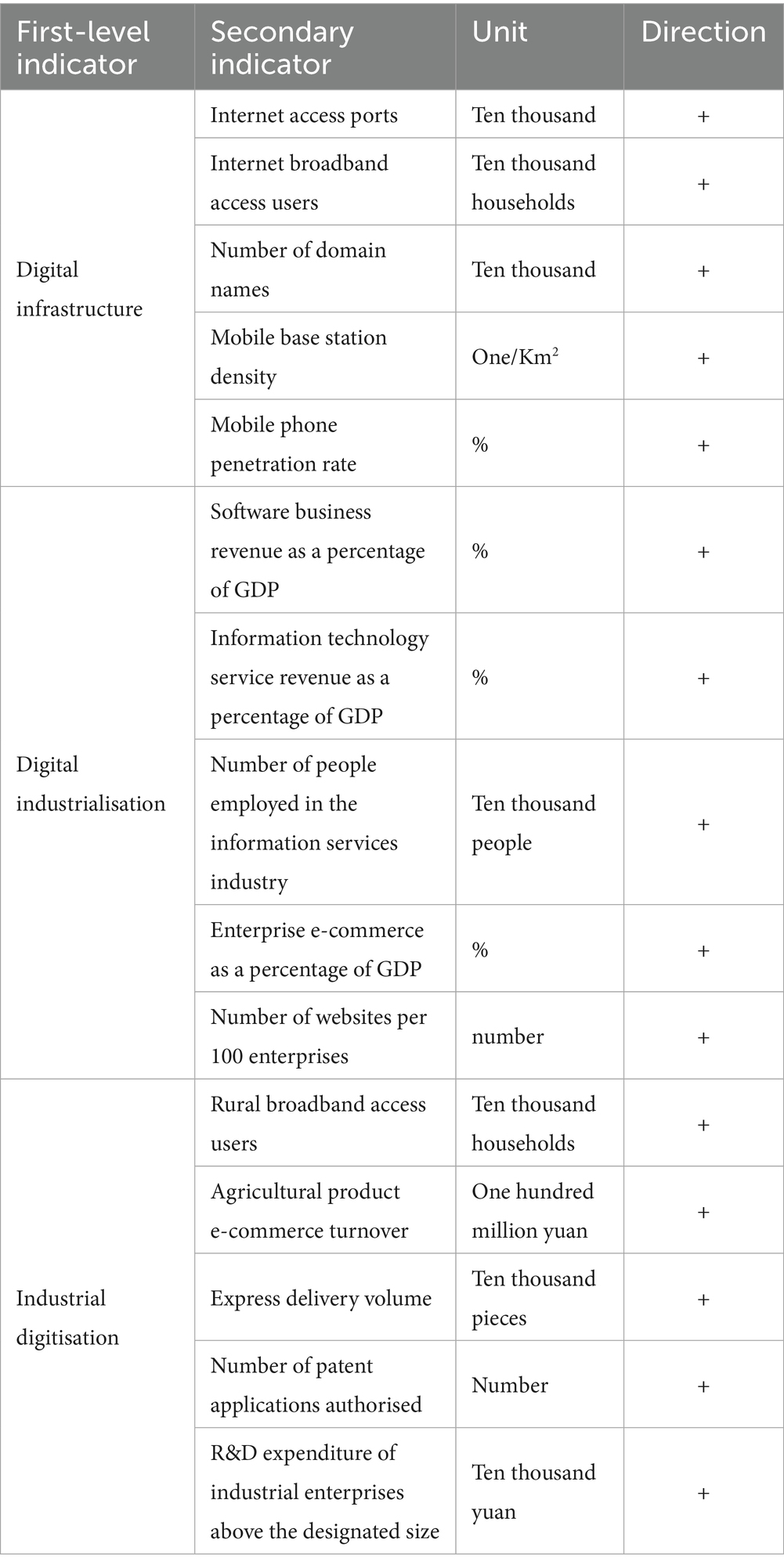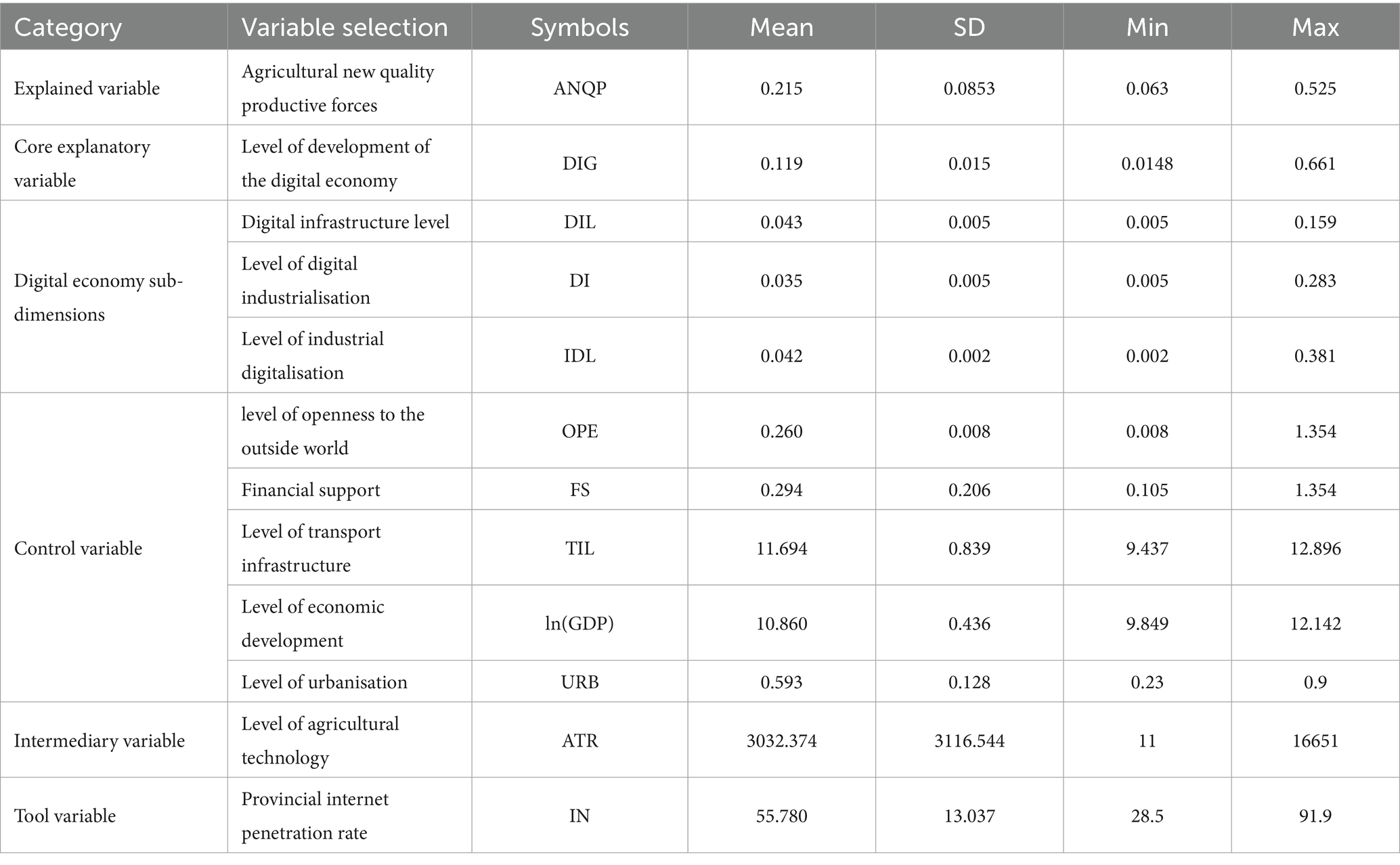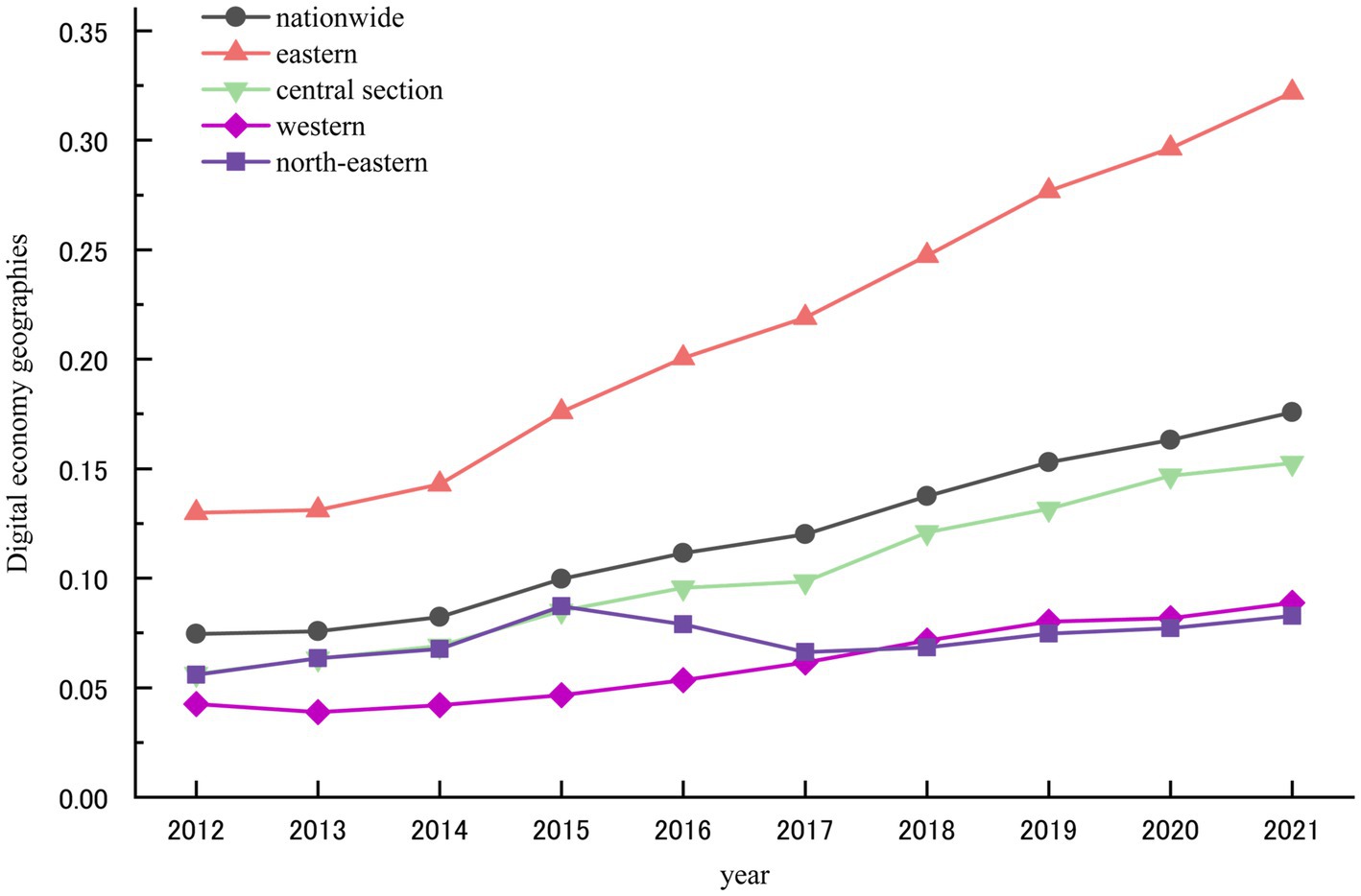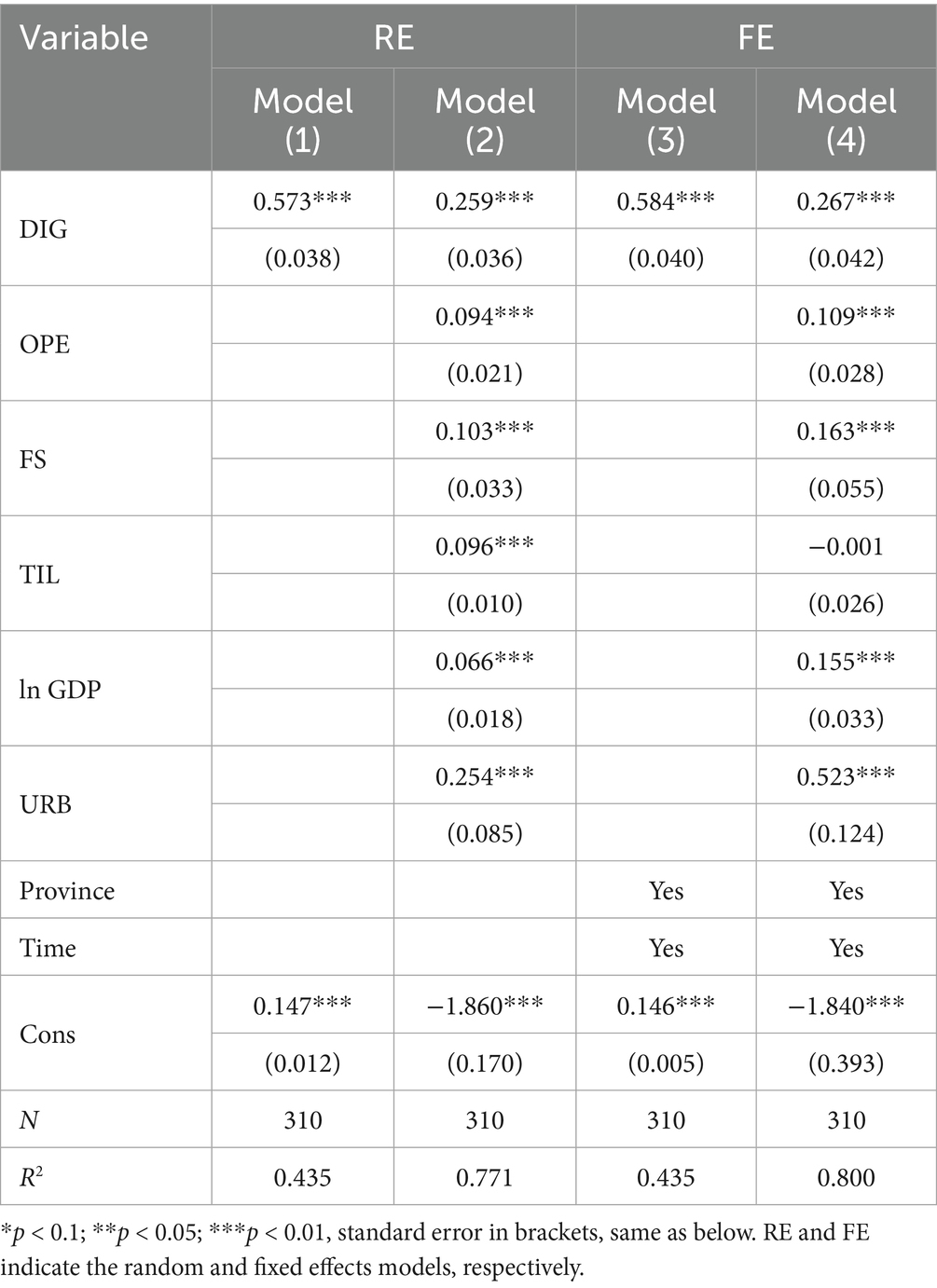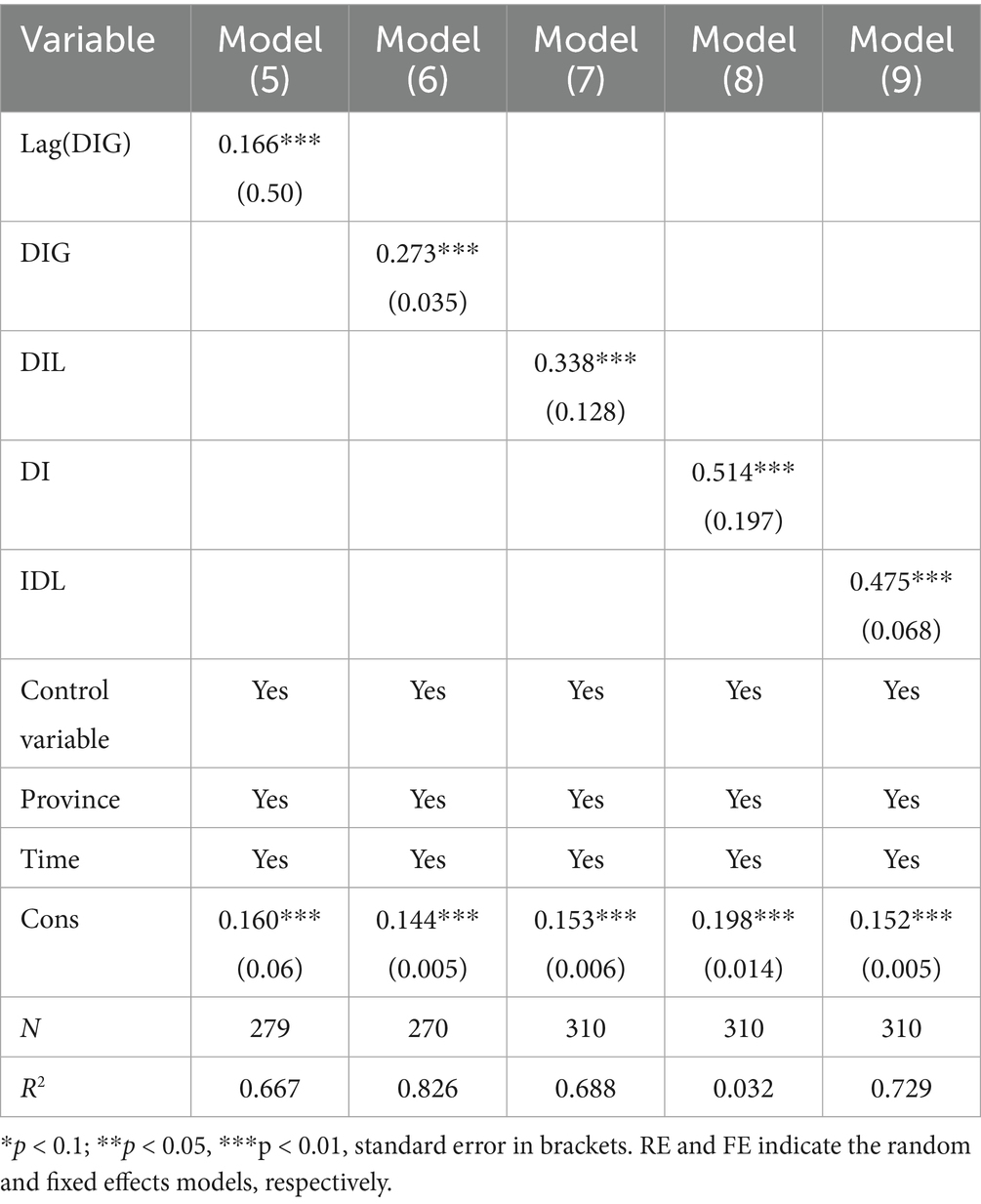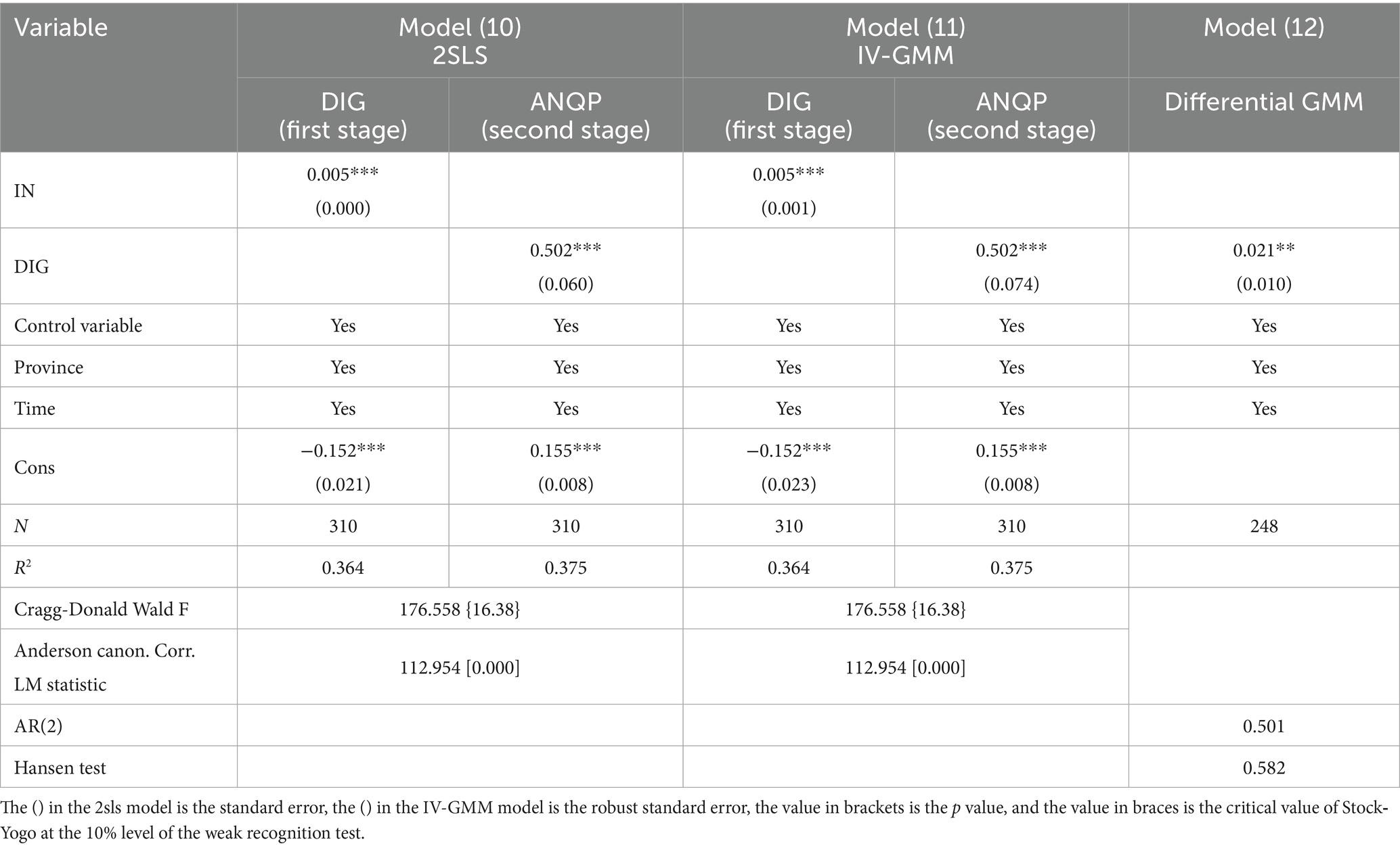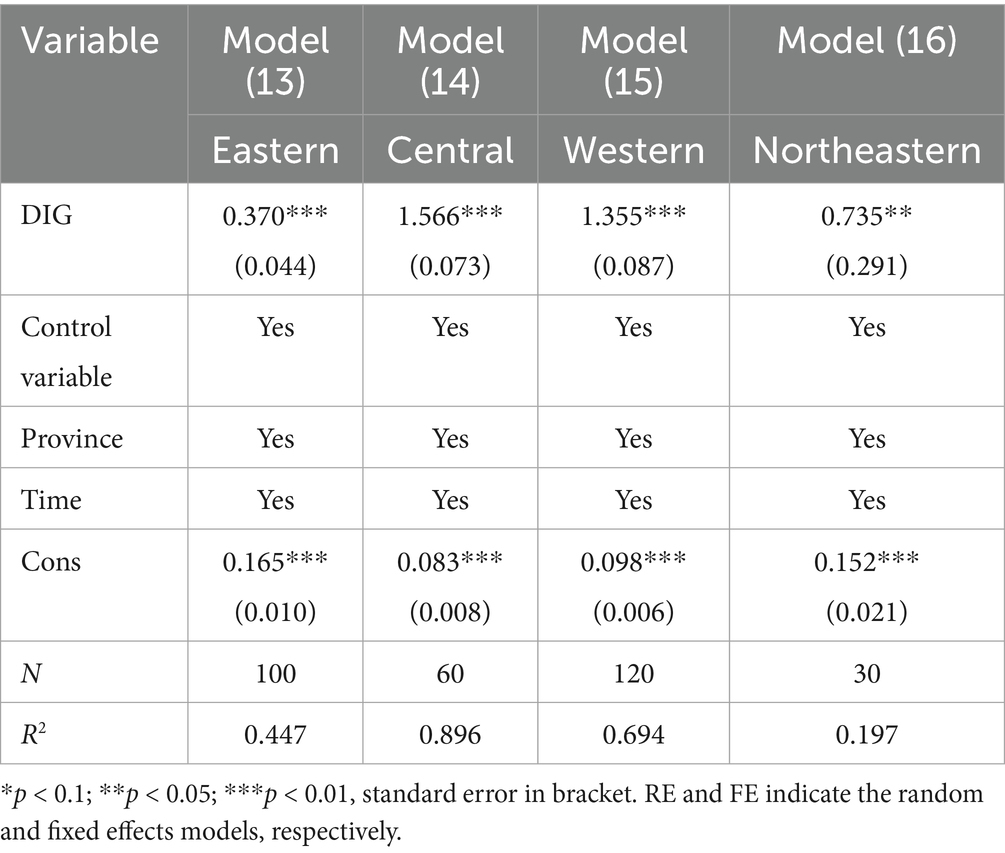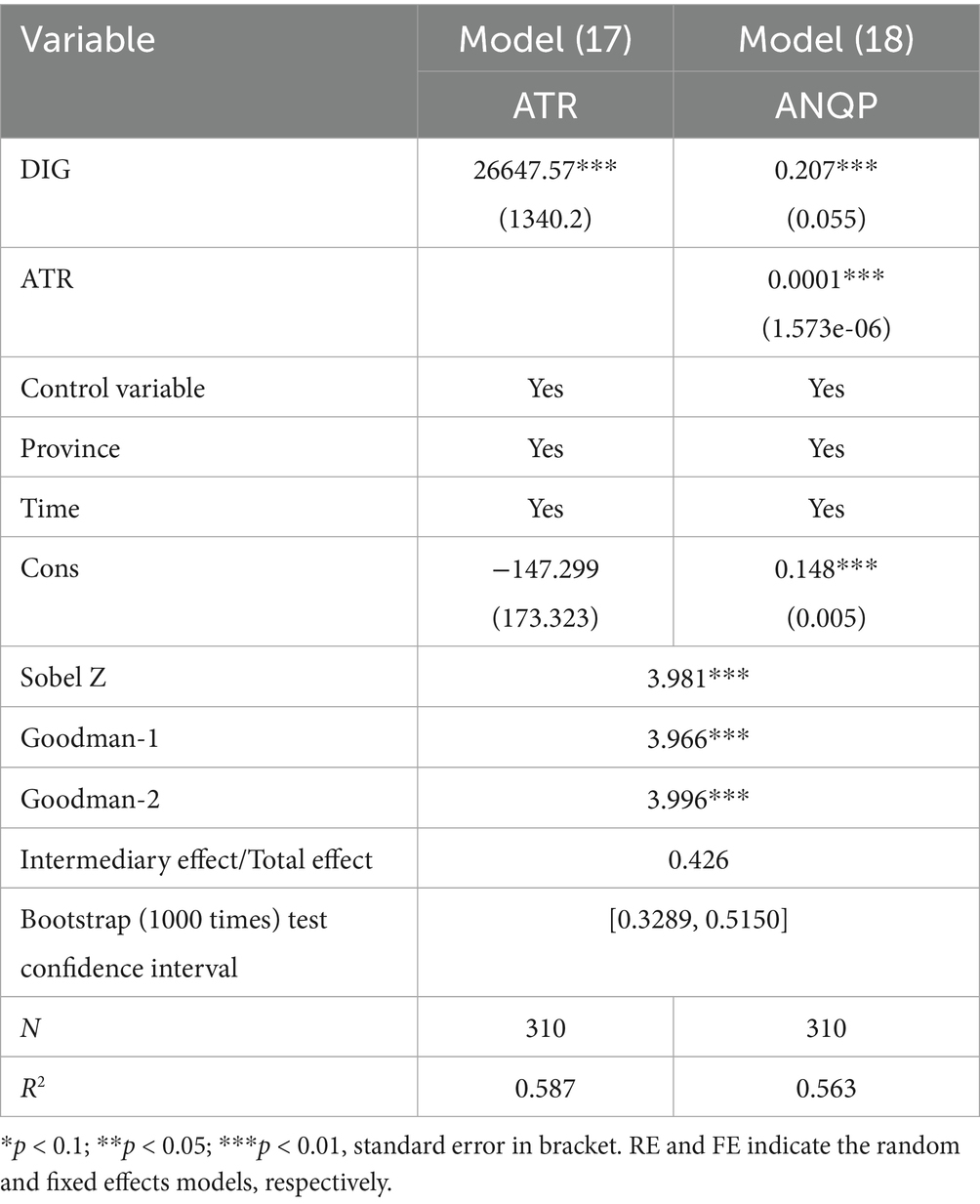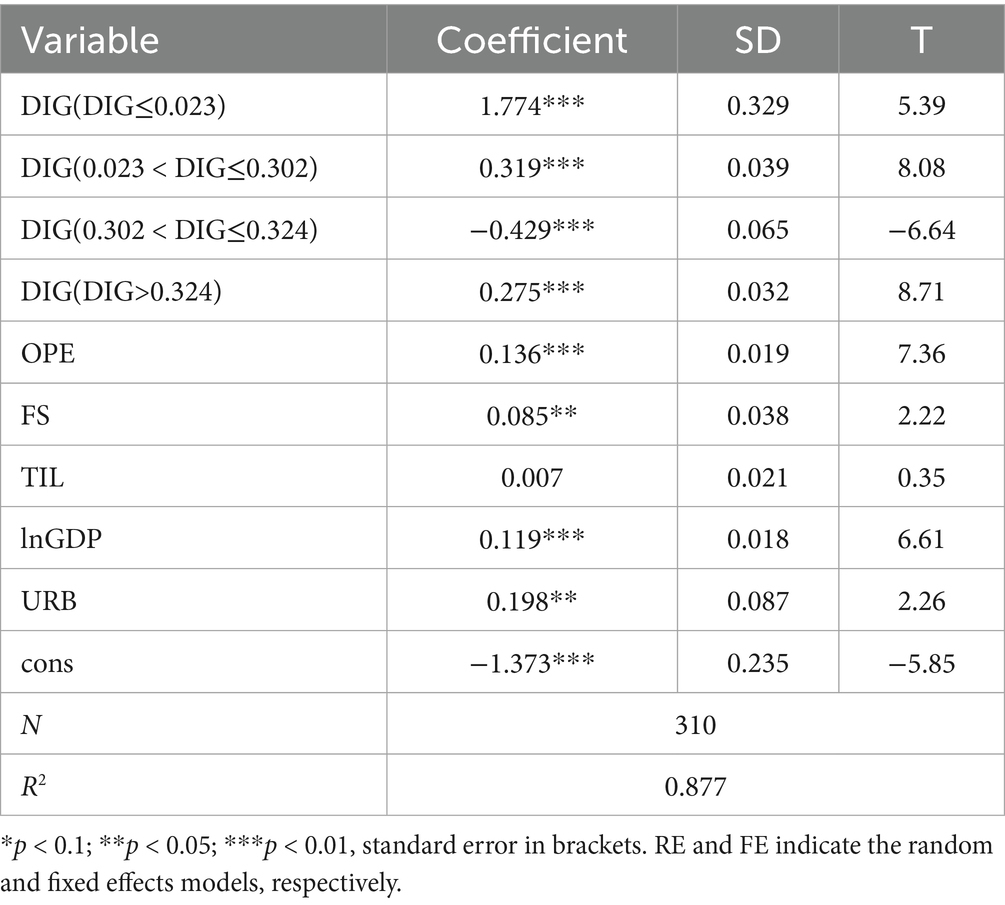- 1School of Economics and Management, Jiangxi Agricultural University, Nanchang, China
- 2Faculty of Humanities and Social Sciences, Macao Polytechnic University, Macao, China
- 3The Rural Land Resource Use and Protect Research Center, Jiangxi Agricultural University, Nanchang, China
- 4Rural Development Research Center, Jiangxi Agricultural University, Nanchang, China
The digital economy is an important driving force for developing agricultural new quality productive forces. This academic is based on panel data from 31 provinces in China from 2012 to 2021. It uses econometric methods such as the two-way fixed effect model, the mediating effect model, the panel threshold model, and the spatial autoregression (SAR) model to empirically study the impact effect and mechanism of action of the digital economy on agricultural new quality productive forces. Research shows that (1) The digital economy significantly promotes agricultural new quality productive forces, and this conclusion is still valid after considering a series of endogenous tests. (2) The digital economy has obvious geographical differences in its effect on generating agricultural new quality productive forces. (3) Agricultural technological progress is an important mechanism through which the digital economy affects the promotion of agricultural new quality productive forces. (4) Further research has found that the digital economy has a ‘promoting-inhibiting-promoting’ nonlinear threshold effect on agricultural new quality productive forces. (5) The digital economy exerts considerable regional spillover effects on agricultural new quality productive forces. This study proposes four recommendations based on the current conclusions. (1) The government should enhance and endorse the advancement of the digital economy while mitigating regional disparities in its development. (2) The local government should expedite the development of digital infrastructure to facilitate the transition from traditional agricultural to digital agriculture. (3) Local governments should contribute to the progression of agricultural technologies. (4) local governments should leverage the spatial spillover effect of the digital economy to facilitate coordinated regional growth.
1 Introduction and review of literature
Amidst the digital revolution of the global economy and the accelerated modernisation of agriculture, China’s agricultural sector is at a pivotal point where ‘quantitative change’ will lead to ‘qualitative change’. Although China feeds 20% of the world’s population with only 7% of the world’s arable land (Smil, 1995), the sustainable development of modern agriculture in China is still subject to multiple constraints: prominent rigid conflicts over resources (Chen et al., 2019), rising production costs (Zhang, 2021), profound technology disconnection (Hu et al., 2024), and insufficient resilience of the industrial chain (Yin et al., 2021). These issues jeopardise national food security and hinder the attainment of rural revitalisation and high-quality agricultural development objectives. In this context, the Chinese Government has introduced the strategic concept of ‘Agricultural New Quality Productive Forces.’
Agricultural new quality productive forces represent a contemporary idea emerging from the modernisation of agriculture, in contrast to conventional productive forces. The essence of new quality productive forces in agriculture is to significantly increase total factor productivity through technical innovation and resource reorganisation. Crucial and disruptive technical advancements will precipitate an innovative revolution inside the industrial chain, resulting in a transformative shift in agricultural productivity (Zhou and Xu, 2023). Meanwhile, the digital economy has emerged as a key factor in transforming the economic structure and enhancing national competitiveness within the context of the technological revolution and industrial upgrading. The evolution of the digital economy has increasingly emerged as a crucial facilitator for the enhancement of agricultural new quality productive forces and has also served as a novel engine for the modernisation of agriculture and the reinforcement of national food security. Examining the influence and mechanisms of the digital economy and new quality productive forces in agriculture is crucial for realising rural revitalisation objectives, fostering high-quality agricultural development, improving agricultural production efficiency, upgrading industrial structures, and optimising resource allocation. Furthermore, it significantly affects the establishment of an agricultural powerhouse and the progression towards socialism with Chinese characteristics.
Current research on agricultural new productivity mainly focuses on the following two aspects. First, cultivating the agricultural new quality productive forces. The advancement of digital technology and the enhancement of the digital economy are crucial avenues for fostering new quality productive forces in agriculture (Wang and Yang, 2023; Luo and Geng, 2024). The digital economy, focused on the Internet and big data technologies, possesses significant innovative vigour and growth potential, serving as a crucial driving force for China’s high-quality economic development (He et al., 2022). The digital economy serves as the primary catalyst of the fourth industrial revolution, reshaping industrial factors through the development of digital infrastructure, upgrading industrial processes, and advancing digital industrialisation (Tan et al., 2024), thereby enhancing the quality of agricultural productive forces. The China Digital Economy Development Research Report (2024) from the China Academy of Information and Communications Technology indicates that China’s digital economy will reach 53.9 trillion yuan in 2023, or 42.8 per cent of GDP, an increase of 1.3 per cent from 2022. In light of the burgeoning digital economy, China has underscored the necessity to enhance the development of new quality productive forces tailored to local conditions and to refine the system that fosters the profound integration of the real economy with the digital economy, thereby indicating a pathway for the advancement of the digital economy to bolster agricultural new quality productive forces. Second, the measurement of agricultural new quality productive forces. Current research predominantly examines the three dimensions of labour: workers, labour objects, and labour resources. Regarding worker quality, Scholars have not only made innovative use of indicators such as the share of agricultural science and technology employees and farmers’ innovation potential to quantify the human capital leap in agriculture (Zhu and Ye, 2024). Additionally, they have introduced the Digital Inclusive Finance Index to elucidate the transformative impact of technological diffusion on worker skills (Wang and Yang, 2023). In the realm of labour object innovation, researchers assessed the technological evolution of production objects through the penetration rate of bio-breeding technology and the coverage rate of green prevention and control technology (Liu, 2023), and they employed the total factor productivity model to validate the impact of resource-intensive utilisation on enhancing the quality of labour objects (Zhong, 2023); from the standpoint of labour means enhancement, the coverage rate of digital infrastructure and the penetration rate of intelligent agricultural machinery illustrated the intelligent transformation of labour means.
Research on the digital economy is more prolific. The digital economy is an economic activity fuelled by digital technological innovation, uses the Internet platform as the primary information carrier, and employs a variety of new business models and forms of expression. Its primary resource is digital information, which includes data elements (Chen et al., 2022). The digital economy evolves via digital technology, transcending geographical and territorial constraints (Ma and Zhu, 2022), and facilitates the transformation and upgrading of old industrial forms by empowering data elements. The expansion of the digital economy into agriculture significantly contributes to empowering rural revitalisation (Zhang and Luan, 2022), fostering the integrated development of rural industries (Chen, 2021), reconfiguring the allocation of rural resources (Huang et al., 2022), and enhancing the resilience of the agricultural economy (Zhao and Xu, 2023). The subsequent introduction of the new quality productive concept has further prompted scholars to consider cultivating agricultural new quality productive forces in the farming industry in the digital economy. Overall, studies are abundant on the digital economy within the agricultural sector, and there is a scarcity of papers focussing on empirical investigations examining the inherent relationship between the digital economy and the new quality productive forces in agriculture.
A study of the current literature indicates a substantial body of research on the digital economy and innovative agricultural productive forces. Several scholars have undertaken empirical investigations to assess the developmental status of innovative agricultural productive forces (Yang and Wang, 2025) and the impact of digital inclusive financing on these agricultural productive forces (Kang and Qirui, 2024). Simultaneously, the evolution of digital technology impacting the agricultural new quality productive forces has garnered the attention of researchers (Zhou, 2024; Wang and Li, 2024). However, there is a dearth of scholarly research on how the digital economy affects agricultural new quality productive forces, which has yet to be explored systematically and in-depth. From a theoretical perspective, the frameworks regarding the influence pathways of the digital economy and the new quality productive forces in agriculture remain inadequately developed, and the current study is disjointed. From an empirical study standpoint, the existing methodology is singular, rendering it challenging to capture the distinctions and intricate relationships between the two variables. From the point of view of research objects, insufficient attention has been paid to the intersection of the digital economy and agricultural new quality productive forces, and the construction of the indicator system lacks uniform standards, which cannot fully reflect the connotation of agricultural new quality productive forces.
Therefore, the marginal contribution of this paper focuses on four main areas: Firstly, this study employs the entropy value approach to assess the development level of agricultural new quality productive forces, utilising the existing indicator system in conjunction with the current agricultural status. Secondly, this paper examines the influence of the digital economy on the new quality productive forces in agriculture using a two-way fixed effects model. Additionally, it posits that technological advancements in agriculture serve a mechanistic function in mediating the digital economy’s impact on agricultural new quality productive forces. Thirdly, this research examines the non-linear impacts of digital economic development and analyses the threshold effect. Fourthly, the research examines the potential spatial spillover effects of digital economy development and evaluates its impact on agricultural new quality productive forces.
2 Theoretical analysis and research hypotheses
2.1 The direct influence of the digital economy on agricultural new qualitative productive forces
The core of agricultural new quality productive forces lies in the efficient reconfiguration of production factors alongside technological innovation, particularly evident in agriculture through the enhancement of production efficiency of capital, labour, and other production elements (Ma and Yang, 2024). The digital economy, characterised by digitalisation and informatisation as production factors, can transcend spatial and geographical constraints in development (Gao and Lyu, 2023), thereby optimising production efficiency and integrating production factors through advancements such as digital industrialisation and industrial digitalisation (Ge and Xun, 2022). In general, the advancement of the digital economy will enhance digital production and intelligence in agriculture, facilitating the innovative emergence of disruptive technologies in this sector and promoting new quality productive forces in agriculture. From the perspective of the specific impact of the digital economy on agricultural new quality productive forces, Marx’s discussion of the labourer, the means of production and the object of production, and the Chinese government’s elaboration that agricultural new quality productive forces are green productivity forces, have laid the basic direction for the development of agricultural new quality productive forces. Therefore, this article will further discuss the four aspects of the digital economy empowering new types of workers, new means of production, new objects of labour, and green agricultural production.
2.1.1 Digital economy cultivates new types of labourers
Individuals are the most dynamic and inventive elements within productive forces, while novel categories of labour objects serve as a crucial foundation for advancing high-quality agricultural productive forces (You and Tian, 2024). Firstly, the digital economy has enhanced individuals’ labour quality (Liu and Wang, 2025). The advancement of the digital economy facilitates effective, rapid, and accessible information technology training, enabling agricultural workers to access skills training, expand their knowledge, and enhance their attributes. Secondly, the digital economy enhances labour efficiency (International Labour Organization, 2021). Intelligent software and technological advancements within the digital economy have markedly enhanced worker efficiency, exemplified by the development of big data platforms and the creation of information-driven smart farms, emancipating workers from monotonous and repetitive tasks. Consequently, employees have increased time to utilise digital platforms to enhance their quality. Ultimately, the digital economy has created new professional opportunities in agriculture (Yang et al., 2024). The extensive utilisation of the Internet, big data, artificial intelligence, and other technology has created numerous new occupations, including data analysts, rural e-commerce operators, and unmanned farm managers. These new professions have not only enhanced the employment options for workers but also offered them career trajectories with more developmental potential.
2.1.2 Digital economy creates new means of labour
The advancement of the digital economy generates novel methods of labour production and further facilitates the emergence of agricultural new quality productive forces. With the advancement of digital technology, intelligent agricultural equipment is extensively utilised. Advanced seeders, harvesters, irrigation systems, and other machinery to revolutionise conventional agricultural practices, augment intelligence in farming, and achieve precise, intelligent, and cost-effective agricultural production. The technological revolution, driven by big data and IoT technology, has led to the emergence of digital platforms for agriculture, including agricultural e-commerce platforms, agricultural product traceability platforms, and agricultural finance service platforms, among others. Digital platforms and data information have become essential tools in new jobs within the digital economy, instigating transformations in labour relations in the digital age (Qi et al., 2021).
2.1.3 Digital economy has created new types of labour objects
In the era of the digital economy, the boundary between labour materials and labour objects is becoming increasingly blurred, and the new factor of production, data, is both labour materials and labour objects. In the era of digitalisation, networking and intelligence, the development of new digital production technologies, such as significant data platform construction and artificial intelligence, enables massive data and information to be effectively collected, processed and utilised, thus giving birth to a new type of labour object (Huang and Sheng, 2024). Specifically, the digital economy has given new types of labour more development possibilities. For instance, by utilising novel sales methods like e-commerce platforms and live streaming for items, individuals can immediately introduce high-quality agricultural goods into the market via digital platforms. It has transformed the conventional multi-tier distribution paradigm of agricultural products, increasing the pricing of agricultural goods and farmers’ incomes. At the same time, digital technology can also promote the integration of agriculture with tourism, culture and other industries, develop new business forms such as leisure agriculture and creative agriculture, and expand the versatility of agriculture.
2.1.4 Digital economy to achieve green agricultural production
The Chinese government has stressed that “green development is the basis for high-quality development, and new quality productive is itself green productivity.” Cultivating new agricultural quality productive forces is also a process of productivity development based on ecology, environmental protection, and greenery. The development of the digital economy is different from that of other industries in the past. The digital economy is an industrial form with low energy consumption and pollution and naturally has the characteristics of green productivity. Using intelligent technology in agricultural production can significantly diminish the usage of chemical fertilisers and pesticides, hence facilitating green agricultural development. In addition, with the construction of digital infrastructure and the development of a digital economy running through all aspects of agriculture, the factor optimisation function of the digital economy can achieve the reduction of carbon emissions in the agricultural field, improve the transformation path and transformation efficiency of the value of forest ecological products, promote the realisation of the value of ecological products, and achieve the goal of agricultural green development (Tian et al., 2024; Kong et al., 2023).
Based on the above theories, hypothesis H1 is proposed: The development of the digital economy is conducive to generating agricultural new quality productive forces.
2.2 Indirect effect of digital economy empowerment of agricultural new quality productive forces
Within the context of productivity theory and technological innovation diffusion theory, agricultural technological advancement is a pivotal variable linking the digital economy to the emergence of new quality productive forces in agriculture, as evidenced by the dynamic coupling mechanism across three dimensions. Firstly, the digital economy capitalises on the embeddedness of data elements to improve the fundamental conditions for technological innovation. For example, IoT sensors, remote sensing monitoring, and other big data analysis tools can collect real-time data on crop growth, assist managers in developing a precise decision-making framework, and facilitate the transition from conventional experience-based technology to contemporary data-driven technology. Secondly, the technological penetration effect of the digital economy has facilitated the reshaping of the agricultural production function’s growth path. By substituting traditional labour tools with digital technology carriers, such as intelligent agricultural machinery and equipment and intelligent pest and disease diagnostic systems, incremental marginal compensation has been achieved, and their technological spillover effects have significantly increased total factor productivity. Lastly, the digital economy has logically reinforced the mechanism effect, reconfiguring the behaviour of technology adopters. New professional farmers, nurtured by online education platforms and digital skills training systems, have a significantly stronger capacity for technology absorption than traditional farmers. Simultaneously, the agricultural socialisation service platform’s intelligent matching mechanism has substantially enhanced the adoption rate of advanced technologies among small and medium-sized producers. The digital economy is characterised by the synergistic evolution of human capital and technology capital, which not only alters the rate of innovation on the supply side of technology but also establishes a two-way enhancement path through adaptive learning on the demand side.
Based on the above theoretical analysis, hypothesis H2 is proposed: Digital economy promotes the generation of agricultural new quality productive through agricultural technological progress.
2.3 The development of the digital economy has a non-linear threshold effect
The development of the digital economy is geographically diverse due to the variations in digital infrastructure, financial support, geographic location, and other factors that influence the development of the digital economy in each region (Li et al., 2024). Examining the development process of the digital economy, it is possible that the digital economy, a novel form of production factor, may have non-linear effects on promoting agricultural new quality productive forces. In light of this, this paper delves deeper into the influence of the digital economy on the agricultural new quality productive forces from the three phases of its development.
The initial phase of the digital economy. At this stage, the digital economy and its infrastructure are nascent, with certain cities and rural areas possessing robust infrastructure designated for pilot initiatives in digital economy development. Thanks to the pilot of the digital economy, rural industries have been affected by digitisation and informatisation, industrial factors have been optimised, transaction costs have been effectively reduced, and information asymmetry has been mitigated (Li et al., 2023). The advancement of the digital economy has facilitated information dissemination in rural areas, promoting non-farm jobs and enhancing rural industry (Wen and Chen, 2020). The advancement of the digital economy can enhance human capital, stimulate the expansion of rural industries, and facilitate industrial integration in the context of rural industrial development (Guo and Miao, 2023). At the aggregate rural level, the advancement of the digital economy mitigates the digital divide, fosters the profound integration and development of urban and rural industries, alleviates relative poverty in rural regions, and reduces the urban–rural disparity (Wu, 2021; He et al., 2020). Therefore, in the initial stage of the digital economy, the development of the digital economy can promote the growth of the agricultural economy, and the marginal effect of the digital economy on the cultivation of agricultural new quality productive forces is increasing.
The second phase is the expansion stage of the digital economy. As the digital economy transitions from the pilot phase to comprehensive development, it accelerates; however, influenced by factors such as digital economy infrastructure and urbanisation levels, its progress exhibits significant geographical disparities, predominantly characterised by eastern regions leading while central and western areas strive to catch up (Zhaoan et al., 2021). Moreover, throughout the expansion phase of the digital economy, the agricultural sector, according to its inherent characteristics, possesses a definitive upper limit to its factor transformation. Concurrently, influenced by the ‘syphon effect’ of the digital economy, there is a tendency for rural resources to be drawn towards regions exhibiting robust digital economic growth, thereby obstructing the emergence of agricultural new quality productive forces within rural areas (Barata, 2019; Yi et al., 2023).
Finally, the mature stage of digital economy development. Currently, the advancement of the digital economy in economically developed regions has reached an advanced stage, with digital infrastructure primarily established, a foundational pattern of industrial digitisation and digital industrialisation developed, and the influence of the ‘digital dividend’ effect of digital economy growth intensified, thereby facilitating the distribution of digital economy benefits in rural areas (Zhang et al., 2023). Moreover, in conjunction with the advancement of China’s digital rural development initiatives and e-government policy support, efforts are being made to enhance digital infrastructure in rural regions, digitise the agricultural sector, and leverage information technology, particularly e-commerce, to augment farmers’ incomes and transform the agricultural industry chain, thereby facilitating significant progress and fostering the emergence of agriculture new quality productive forces (Tao et al., 2022).
Based on the above theoretical analysis, hypothesis H3 is proposed: The digital economy has a non-linear threshold effect on agricultural new quality productive forces.
2.4 The digital economy exhibits spatial spillover effects
The digital economy, characterised by significant permeability, high innovation, and extensive reach, reduces spatial and temporal distances while augmenting the breadth and depth of interregional economic activity connections (Zhao et al., 2020). Scholarly reviews of studies concerning the spatial impact of the digital economy have empirically demonstrated a spatial spillover effect of the digital economy on various dimensions, including its influence on total factor productivity (Yang and Jiang, 2021), high-quality economic development in China (Li and Yang, 2021), and agricultural carbon emissions (Tian et al., 2024). Consequently, the influence of the digital economy on the emergence of agricultural new quality productive forces may potentially result in spatial spillover effects.
Based on the above theoretical analysis, hypothesis H4 is proposed: Digital economy has a spatial spillover effect on generating agricultural new quality productive forces (Figure 1).
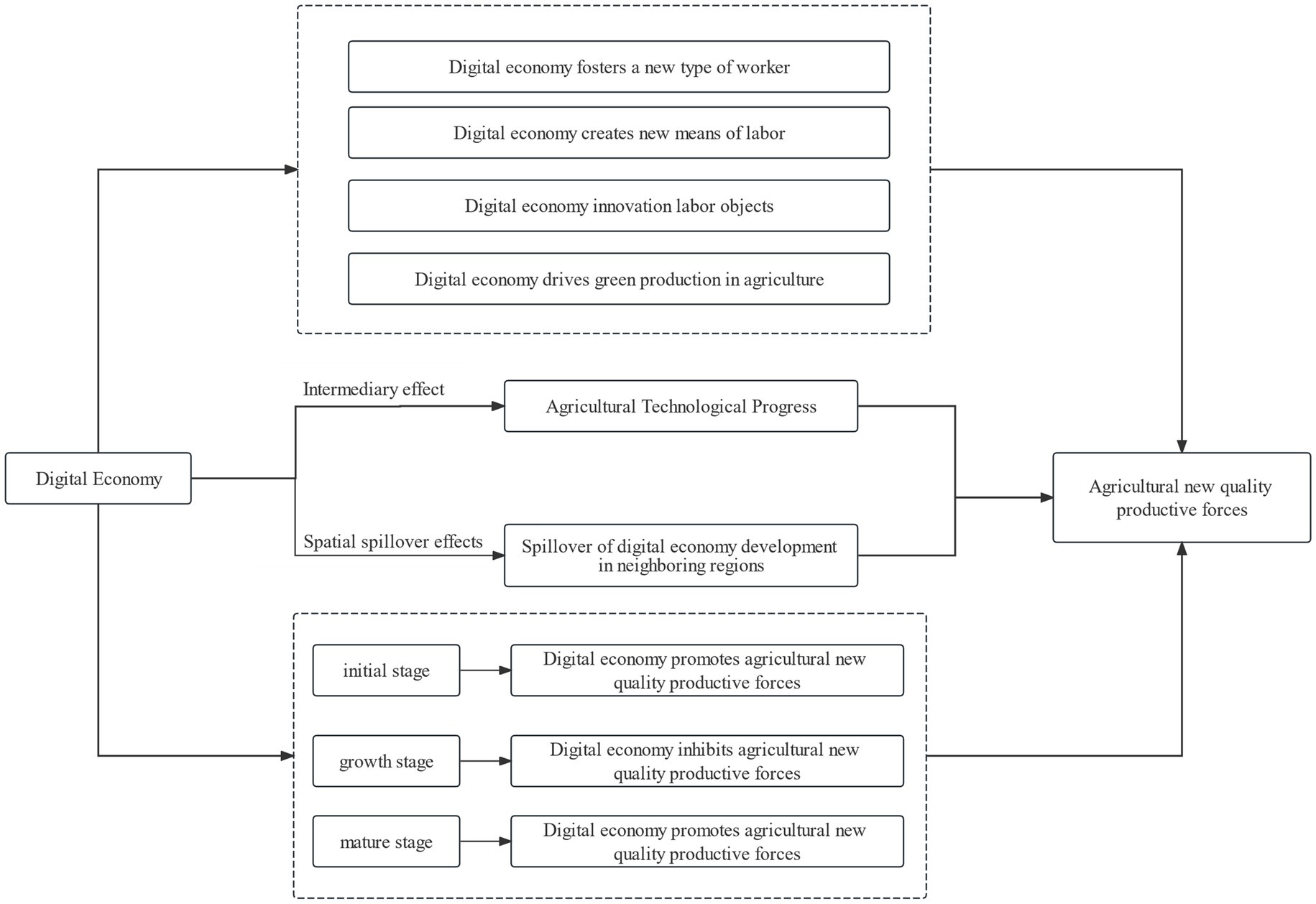
Figure 1. The effect mechanism of the digital economy on agricultural new quality productive forces.
3 Research methodology and selection of variables
In order to verify the above theoretical hypothesis, this paper conducts empirical tests based on the panel data of 31 provincial levels in China from 2012 to 2021. First, the two-way fixed effect model was used to examine the impact of the digital economy on agricultural new quality productive forces. This research employs a mediated effects model to examine the influence of agricultural technical advancement inside the digital economy on the emergence of new quality productive forces in agriculture. This study also conducts a threshold test to ascertain the non-linear effects of the digital economy. Finally, the spatial autocorrelation model (SAR) was used to examine the spatial spillover effect of the digital economy on generating agricultural new quality productive forces.
3.1 Model setting
3.1.1 Two-way fixed effects model examining the impact of the digital economy on the quality of agricultural productive forces
Two-way fixed effects model of the digital economy’s impact on the innovative quality of agricultural productive forces. This study constructed a panel data model, F-test, and Hausman test based on prior theoretical assumptions. According to the results, the fixed effect model outperforms the mixed effect model with a random effect component. The precise model is as follows:
(1) ANQPit is the dependent variable and represents each province’s level of agricultural new quality productive forces. DIGit is the core explanatory variable and stands for the digital economy’s development level. CVSit is a control variable set that affects agricultural new quality productive forces. μi stands for the fixed effect on the area, and γi for the fixed effect on time. εit is the random disturbance term, where i and t represent provinces and years, respectively. α0, α1, and α2 are the constant terms.
3.1.2 Threshold effect model of digital economy development
This paper uses the threshold effect model proposed by existing scholars (Hansen, 1999) for reference to build a threshold effect model with the level of digital economy as the threshold variable. Initially, the formulation of a single-threshold model is presented in Equation 2:
Among them, Qit is the threshold variable, which is also the core explanatory variable, representing the digital economy; I(·) is the indicator function; q is the threshold value, and β1 and β2 are the coefficients. Other symbols have the same meaning as in (1). Equation 2 considers the case of a single threshold. If there is a multiple threshold effect, it can be expanded to a multiple threshold effect model.
3.1.3 The mediating effect model of the digital economy, agricultural technological progress and agricultural new quality productive forces
This paper employs a two-step mediation effect model for testing (Jiang, 2022). Simultaneously, Sobel Z and Bootstrap sample tests are incorporated to enhance the reliability of the two-step mediation effect test results. The specific formulas are as Equations 3 and 4:
In this context, ATR denotes agricultural technological progress, while the remaining symbols retain definitions as specified in Equation 1.
3.1.4 Spatial spillover effects of the digital economy on the agricultural new quality productive forces
The ongoing advancement of the digital economy produces a ‘digital dividend’ that influences the development of the digital economy in adjacent regions and stimulates the emergence of agricultural new quality productive forces, necessitating a deeper analysis of the spatial impact of the digital economy on these agricultural forces. The article first quantifies the spatial autocorrelation between the digital economy and agriculture’s new quality productive forces utilising the global Moran index. Subsequently, it employs the local autocorrelation index to illustrate the spatial agglomeration of these elements. The specific formulas are as follows:
Among them, Equation 5 is the global spatial autocorrelation formula, and Equation 6 is the local autocorrelation formula; and S2 represent the mean and standard deviation of X; X refers to the unit value of the digital economy and agricultural new quality productive forces; n is the number of provincial units studied; Xi and Xj are the attribute values of spatial units i and j; and Wij is the spatial weight matrix (the spatial weight matrix selects the geographical adjacency matrix and the economic geography nested matrix). The study employed LM, LR, Wald, and joint significance tests for model selection, grounded in identifying spatial autocorrelation. This article ultimately picked the spatial autocorrelation model (SAR) as the spatial measurement model. Finally, the spatial autoregression (SAR) model was selected as the spatial econometric model. The specific formulas are as Equation 7:
Where ρ1 denotes the spatial autoregressive coefficient, W represents the spatial weight matrix (derived from the geographic neighbourhood matrix and the economic-geographic nested matrix), and the other symbols retain their meanings as defined in Equation 1.
3.2 Variable selection and measurement
3.2.1 Explained variables
The selection of the agricultural new quality productive forces index refers to the selection of existing research on agricultural new quality productive forces (Zhu and Ye, 2024; Yang and Wang, 2025; Li et al., 2024). It constructs four first-level indicators: new labourers, new labour materials, new labour objects and agricultural green productivity. Specific secondary indicators are selected in Table 1. Agricultural carbon emissions are calculated according to the studies of existing scholars (Song et al., 2024; Ding et al., 2022).
3.2.2 Core explanatory variable
The measurement method of the digital economy refers to the existing literature research (Zhao et al., 2020; Wang et al., 2021). It constructs three first-level indicators: digital infrastructure, industrial digitalisation and digital industrialisation. Table 2 displays the particular selection of secondary indicators.
3.2.3 Mediating variables
The expansion of the digital economy can enhance factor allocation and combine diverse resources to advance agricultural technological progress, including the invention of agricultural patents, thereby fostering agricultural new quality productive forces. Current methodologies for evaluating technical advancement in agriculture primarily focus on total factor productivity and the number of agricultural patents. Considering data availability, this paper references prior work (Su et al., 2022) and quantifies agricultural technological progress using the count of patents in three agricultural areas.
3.2.4 Control variable
In order to reduce the bias caused by missing variables and thus ensure the reliability of the research results, in this paper, concerning relevant literature (Kang and Qirui, 2024; Huang and Sheng, 2024; Yi et al., 2023), the level of opening up to the outside world, financial support, transportation infrastructure, economic development and urbanisation are selected as control variables.
Openness to the external environment (OPE): defined by the total volume of imports and exports of products relative to the gross regional product. A greater degree of openness to the external environment facilitates the adoption of advanced agricultural technologies, enhances the efficient distribution of agricultural resources within the region, and fosters the emergence of agricultural new quality productive forces.
Fiscal support (FS): defined by the ratio of general budget expenditure to GDP. Regions with substantial financial backing are comparatively advanced in digital infrastructure development, talent cultivation, and other social and public service systems, facilitating digital agriculture’s advancement and fostering new quality productive forces.
Movement infrastructure (TIL): the quantity of road miles is quantified logarithmically, and the aggregate volume of goods movement is also quantified logarithmically. The construction of transport infrastructure can enhance agricultural transport connections, facilitate the movement of agro-industrial resources, mitigate the misalignment of agricultural inputs, promote agricultural technology dissemination, and improve agricultural production (Ji, 2021).
Economic development level (lnGDP): Assessed by logarithmic GDP per capita. The degree of regional economic development significantly impacts local agricultural advancement and the consolidation of production factors. In less developed regions, the digital economy faces limitations due to inadequate digital infrastructure and a lower informatisation level in rural industries, causing the agricultural sector’s digital transformation to lag behind that of the non-agricultural sector. Consequently, advancements in regional economic development can significantly enhance the emergence of agricultural new quality productive forces.
Urbanisation level (URB): quantified by the ratio of urban population to total population. Generally, regions with increased urbanisation exhibit a corresponding advancement in digital economic development. These regions have leveraged the advancement of digital technology and the dissemination of technological innovation to steer the digital transformation of rural industries and foster the emergence of new quality productive forces in agriculture.
3.2.5 Instrumental variables
In order to mitigate the potential endogeneity issue in this research, we cite relevant studies (Hua-hua et al., 2018) and identify the provincial Internet penetration rate as an instrumental variable for the development of the digital economy. The selection of instrumental variables must satisfy the criteria of “relevance” and “homogeneity.” On the one hand, as an important representation of the development of the digital economy, Internet penetration is closely related to the digital economy. On the other hand, the Internet penetration rate is not directly related to the agricultural new quality productive force. Therefore, as an instrumental variable, Internet penetration satisfies the conditions of “externality” and “relevance.”
3.3 Source of data
This study utilises data from 31 provinces in China, omitting Hong Kong, Macao, and Taiwan due to its completeness and availability. Among them, the number of agricultural green cooperatives, green agricultural enterprises, and seed enterprises were all from the China Agriculture-related Research Database (CCAD) of Carter-Enterprise Research Institute of Zhejiang University. The other data comes from The China Statistical Yearbook, China Rural Statistical Yearbook, China Population and Employment Statistical Yearbook, China Information Yearbook, China Information Industry Yearbook, the official website of the National Bureau of Statistics, relevant data from the China Academy of Information and Communications Sciences, and provincial statistical yearbook data. This research employs the linear interpolation method to maintain data integrity amidst individual missing values. The study assessed multicollinearity for each variable, revealing a maximum Variance Inflation Factor (VIF) of 5.68 and an average VIF of 3.86, suggesting the absence of significant multicollinearity and confirming that the selected variables satisfy the fundamental criteria. The descriptive statistics of the main variables are shown in Table 3.
4 Research results and analysis
4.1 Analysis of the development level of the digital economy and agricultural new quality productive forces
The entropy method is employed to determine the development level of the digital economy and agricultural new quality productive forces in 31 provinces from 2012 to 2021, following the indicator system proposed in the previous section. Table 4 presents the outcomes, displaying just those from 2012, 2017, and 2021 owing to spatial limitations.
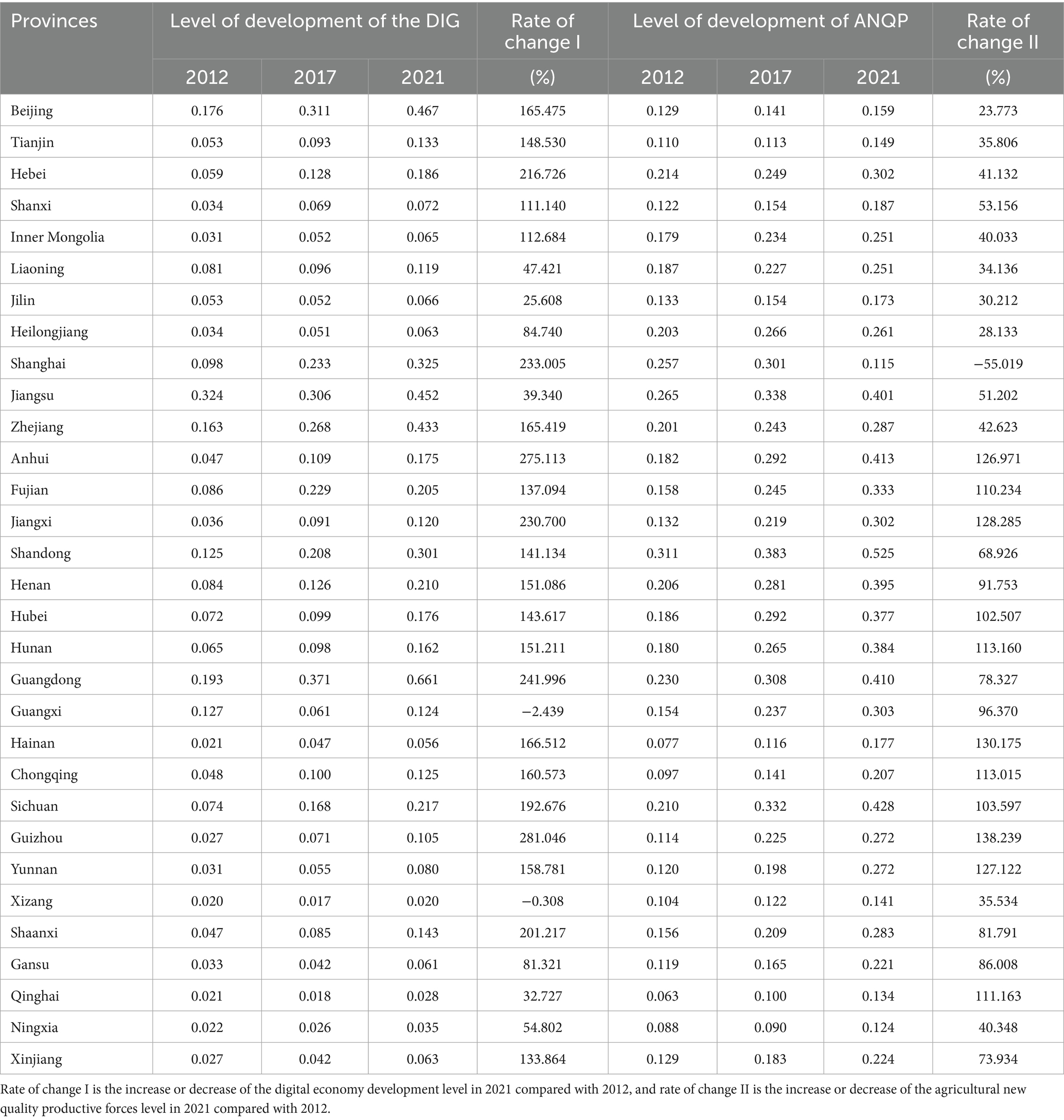
Table 4. Development level of the digital economy and agriculture new quality productive forces in 31 provinces of China.
As seen from Table 4, the development level of the digital economy in Guangdong Province in 2021 ranks first in China, with a value of 0.661. The development level of the digital economy in Beijing, Jiangsu, Zhejiang, and other places exceeds 0.4, and the gap is small. Meanwhile, Tibet has the lowest level of development in the digital economy. From the overall analysis, compared with 2012, except for Guangxi and Tibet, the digital economy development trend of the remaining 29 provinces in China in 2021 shows an upward trend. Among them, Guizhou province has the most significant change in growth rate, with a change rate of 281.046%, which may be because Guizhou region has undertaken a large number of data centre construction in China in recent years, driving the rapid development of Guizhou’s digital economy. Further analysis of the results of the geographic division of digital economy development in Figure 2 shows that the development level of digital economy in the eastern region is in a leading position compared with the rest of China, showing a development trend of leading in the eastern region, catching up in the central region, and lagging in the western and northeast regions. In general, the geographical differences in the development level of the digital economy in China are relatively noticeable.
From the analysis of the development level of agricultural new quality productive forces. In 2021, Shandong Province ranked first in the nation with a level of agricultural new quality productive forces at 0.525, while Jiangsu, Anhui, and Guangdong exceeded 0.4. In 2021, Shanghai had the lowest level of agricultural new quality productive forces, likely attributable to the city’s urban growth focus, wherein agriculture is not a primary industry; except for Shanghai, the agricultural new quality productive forces in 30 provinces of China shown an upward trend compared to 2012. Guizhou Province saw the most significant growth, with a change rate of 138.239 per cent. Additional examination of the developmental trajectory of regional delineation about the agricultural new quality productive forces, as seen in Figure 3. The geographical disparities in agricultural new quality productive forces in China are comparatively minor, exhibiting a developmental pattern from Central to East, West, and North-East. China’s policy has historically prioritised the three rural issues, providing substantial financial and policy support for agricultural scientific and technological advancement, the training of agricultural personnel, and the development of leading agricultural enterprises, thereby establishing a framework for the coordinated development of agricultural new quality productive forces.
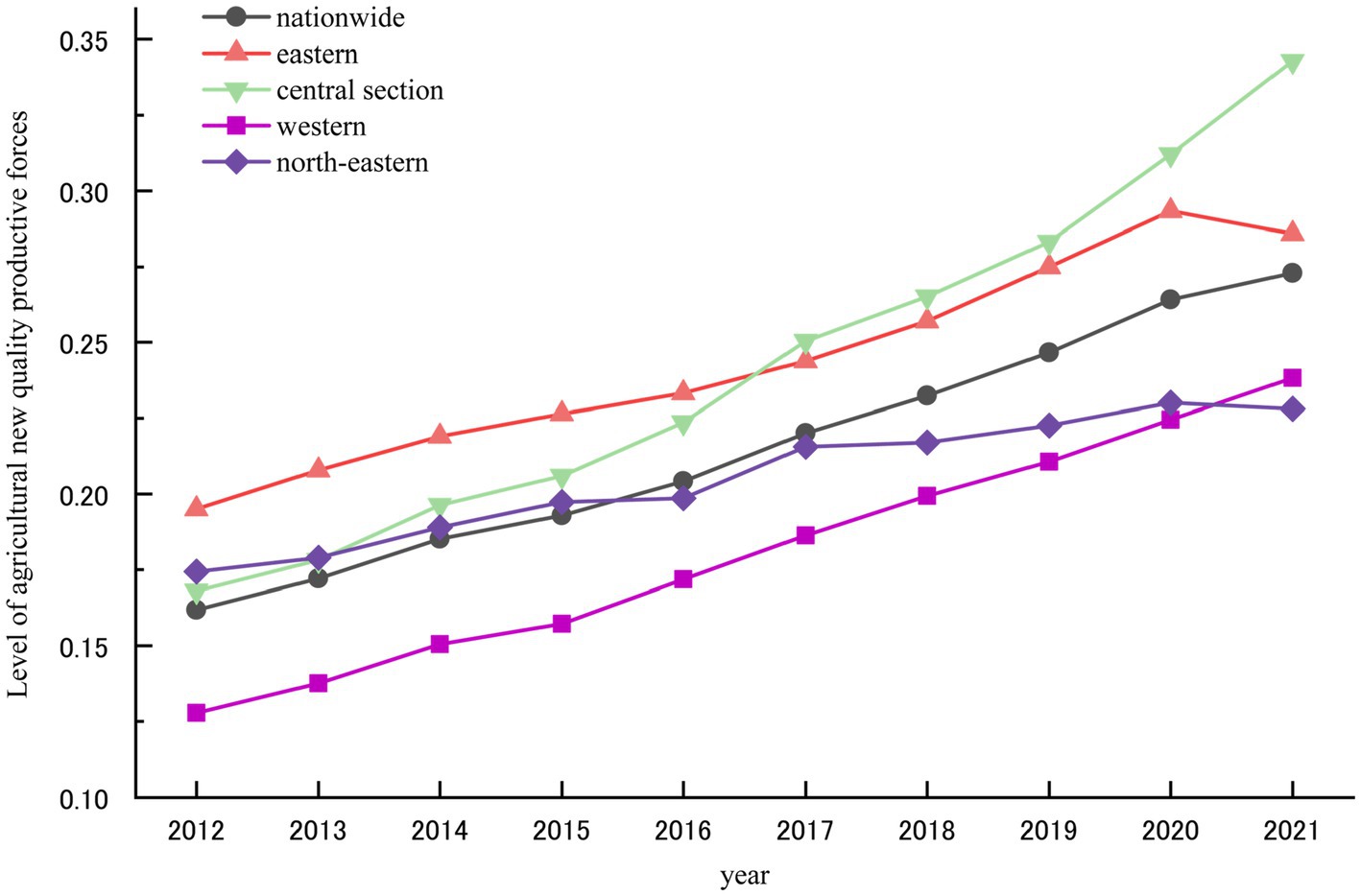
Figure 3. Development trends in the geographical division of agricultural new quality productive forces.
4.2 Baseline regression analysis
Following the prior panel data model selection test procedure, this study conducted the F-test and Hausman tests, revealing that the fixed effects model outperforms both the random and mixed effects models. Furthermore, to enhance the trustworthiness of the regression findings in this paper, the random effects regression results are presented in Table 5. Models (1) and (2) present random effects regression outcomes, while models (3) and (4) exhibit fixed effects regression findings. Both random effects and fixed effects model regressions consistently demonstrate that the influence of the digital economy on the agricultural new quality productive forces is robust. The regression analysis of the model (4) with fixed effects, including all control variables, indicates that the level of agricultural new quality productive forces will increase by 0.267 per cent for every 1 per cent change in the digital economy.
Moreover, the regression analysis of the model (4) in Table 5 indicates that the control variables—openness to external markets, financial support, economic development, and urbanisation—passed the 1% significance test and positively contributed to the agricultural new quality productive forces. For each 1 per cent variation in openness to the external environment, financial support, economic development, and urbanisation, the Agricultural new quality productive forces increase by 0.109 per cent, 0.163 per cent, 0.155 per cent, and 0.523 per cent, respectively. However, the level of transportation infrastructure has an adverse effect, and every 1% change in transportation infrastructure level leads to a 0.001 decrease in agricultural new quality productive forces. The potential cause is the degree of openness to the external world, which can facilitate the introduction of foreign advanced agricultural elements and agricultural science and technology to propel the advancement of China’s agricultural quality productive forces. Enhanced financial support can effectively facilitate agricultural technological advancement, bolster grassroots agricultural technical services, and augment the efficiency of agricultural technology. Increased economic growth correlates with enhanced financial assistance, improved agricultural infrastructure, and more sophisticated agricultural technology services in the agricultural sector, hence fostering the emergence of agricultural new quality productive forces. The digital economy and agricultural technology innovation are notably advanced in regions with elevated urbanisation, potentially resulting in agricultural new quality productive forces. Two possible reasons why building transport infrastructure might hurt agricultural new quality productive forces are: First, there is a delay in the return of the effect of building transport infrastructure. Second, the threshold effect exists in the development of transport infrastructure in China; substantial investment and elevated stock levels may lead to the risk of over-investment or excessive building. This condition may induce a ‘crowding-out impact’ on other sectors of the national economy (Chen et al., 2021).
4.3 Robustness test
In order to ensure the reliability of the benchmark regression results, this paper adopts three methods: digital economy regression with a delay of one period, excluding samples of municipalities directly under the central government, and digital economy fractal regression test to conduct a robustness test. Table 6 illustrates the particular outcomes.
Model (5) in Table 6 presents the regression results of the one-period lagged digital economy on the agriculture new quality productive forces; model (6) displays the regression results excluding the four municipalities of Beijing, Shanghai, Chongqing, and Tianjin. Models (7), (8), and (9) present the regression outcomes for the three sub-dimensions of the digital economy: digital infrastructure, digital industrialisation, and industrial digitisation, respectively. The thorough regression analysis indicates that the influence of the digital economy on the agricultural new quality productive forces remains consistent.
Based on this, hypothesis H3 is valid: The digital economy can promote the generation of agricultural new quality productive forces.
4.4 Endogeneity test
This paper examines the potential causal relationship between the development of the digital economy and the emergence of agricultural new productive forces. To assess the presence of endogeneity, it employs the provincial Internet penetration rate as an instrumental variable for digital economy development, utilising two-stage least squares (2SLS), IV-GMM, and differential GMM models for the endogeneity test. Table 7 illustrates the particular outcomes. Simultaneously, to ascertain the validity of instrumental variables, this research does an unidentifiability test and a weak instrumental variable test separately. Firstly, the p-value of the Anderson canon LM statistic about the non-identifiability test is significant at the 1% level, hence rejecting the null hypothesis of non-identifiability and confirming the correlation between the instrumental and explanatory variables. Secondly, the Cragg-Donald Wald F-statistic for assessing the correlation between instrumental and explanatory variables is 176.558, exceeding the threshold value of 16.38 at the 10 per cent significance level. The instrumental variables used in this study have a significant correlation with the primary explanatory variables, and there is no issue of weak instrumental variables.
Analysis of the regression outcomes from models (10) and (11) indicates that the impacts of the primary explanatory factors on the agricultural new quality productive forces are mainly consistent with the findings of the benchmark regression. This research employs differential GMM estimation utilising the first-and second-order lagged components of the primary explanatory variable (digital economy) as instrumental variables to alleviate the estimated bias resulting from the endogeneity issue. The Hansen test results demonstrate that the instrumental variables are not subject to over-identification problems. The differential GMM regression results for model (12) indicate that the digital economy continues to contribute to producing agricultural new quality productive forces at a statistically significant level of 5 per cent after controlling for endogeneity.
4.5 Heterogeneity analysis
China is an expansive nation, exhibiting regional disparities in advancing its digital economy. This research examines heterogeneity by classifying the cities in the sample based on the country’s geographical location into eastern, central, western, and northeastern areas.
Analysis of the regression results in Table 8 indicates that the digital economy substantially enhances the quality of agricultural productive forces throughout all four regions of China, albeit with notable variations. The digital economy in the central and western regions significantly enhances the advancement of agricultural new quality productive forces. However, its impact is comparatively less evident in the eastern and northeastern regions. The rationale for the differentiation may be as follows: The central region, as the focal area of the national food security strategy, has profited from the ‘Rise of Central China’ and ‘Digital Countryside’ initiatives. The disproportionate distribution of policy resources from the central government and local finances has directly facilitated the concentration of technological elements in major grain-producing areas, exemplified by subsidies for the digital enhancement of high-standard farmland and the acquisition of advanced agricultural machinery. Simultaneously, leveraging the continuous distribution of arable land in the central plains, digital technology can optimise marginal gains in extensive production contexts. Therefore, the digital economy has the most substantial influence on the new qualitative productive forces in the central region of agriculture. Secondly, despite the Western region’s advantages from the infrastructure focus of the ‘Western Development’ and ‘Eastern Data and Western Computing’ strategies, the implementation of digital technology encounters dual challenges: elevated scene adaptation costs and limited service coverage stemming from the decentralised nature of mountainous agricultural practices. Consequently, the realisation of technological benefits is trailing behind policy anticipations. The distribution of dividends falls short of policy anticipations. The dual limitations of traditional heavy industry route dependence, agricultural institutional rigidity, and considerable delays in policy execution and inadequate integration of digital technology in agricultural machinery hinder the Northeast region. In the eastern region, due to the transformation and enhancement of the economic structure and the persistent decline in agriculture’s contribution to the overall economy, local governments are inclined to prioritise the distribution of digital resources to high-value-added sectors such as industrial internet and cross-border e-commerce. This results in the lowest sensitivity of the digital economy’s impact on the new quality of agricultural productive forces.
4.6 Mechanism test
Examining the mediating impacts of the digital economy on the agricultural new quality productive forces via a two-step mediating effects model. Table 9 presents the regression outcomes of the two-step mediation effects examination and the associated Sobel Z and Bootstrap self-help sample test results.
The regression analysis of models (17) and (18) indicates that the digital economy significantly influences the agricultural new quality productive forces at the 1% level, and agricultural technological progress serves as a mediating factor in the digital economy’s enhancement of agricultural new quality productive forces. The Sobel Z test transformed the province and time-fixed effects into dummy variables. The test results showed that Sobel Z was 3.981 > 1.96 and was significant at a 1% level, and the mediating effect accounted for 42.6% of the total effect. At the same time, the results of the Bootstrap(1000 times) test show that the confidence interval does not include 0, indicating that the intermediary effect exists significantly. Meanwhile, the confidence interval does not encompass 0, as evidenced by the Bootstrap (1000 times) test results, suggesting that the mediating effect is significantly present.
Based on this, hypothesis H2 is valid: The digital economy promotes the generation of agricultural new quality productive forces through the progress of agricultural technology.
5 Further analysis
5.1 Threshold effect of the digital economy on agricultural new quality productive forces
Threshold implications of the digital economy on the emergence of agricultural new quality productive forces. Before conducting regression analysis on the threshold effect, it is essential to ascertain a threshold effect of the digital economy and identify the corresponding threshold value. Table 10 presents the test findings, indicating that the digital economy threshold test reveals a triple threshold effect, with threshold values of 0.023, 0.302, and 0.324, all significant at the 1 per cent level.
The work also delves into the regression analysis of the digital economy on agricultural new quality productive forces after establishing the threshold value of the digital economy. Table 11 shows the comprehensive results. The digital economy favourably influences the development of agricultural new quality productive forces at a 1% statistical significance level, with a regression coefficient of 1.774 when the digital economy level is within the interval of (DIG<0.023). The digital economy positively influences agricultural new quality productive forces at the 1% significance level when the digital economy level is within the interval (0.023 < DIG < 0.302), with a regression coefficient of 0.319. Conversely, it negatively impacts agricultural new quality productive forces at the 1% significance level when the digital economy level is within the interval (0.302 < DIG < 0.324), with a regression coefficient of −0.429. The digital economy significantly influences the agricultural new quality productive forces at a 1% significance level, with a coefficient of 0.275, when the digital economy level exceeds 0.324. In general, the effect of the digital economy on agricultural new quality productive forces shows the threshold effect of diminishing marginal effect.
The reasons are as follows. Initially, during the nascent phase of the digital economy, its advancement can significantly enhance the optimisation of agricultural production factors, facilitating the digital transformation of the agricultural sector and fostering agricultural new quality productive forces. Then, entering the growth stage of the digital economy, the “siphon effect” of the development of the digital economy appears. Some advantageous regions intensify the factor plunder of the non-agricultural and agricultural sectors. The digital economy’s development negatively affects agricultural new quality productive forces. Finally, the development of the digital economy has entered a relatively stable and mature stage. The transformation of the agricultural industry and the widespread dissemination of the experience of digitised agricultural production have been facilitated by the development of the digital economy, which has positively impacted the new quality productive forces of agriculture.
Based on this, hypothesis H3 is valid: There is a nonlinear threshold effect of the digital economy in promoting the generation of agricultural new quality productive forces.
5.2 Spatial spillover effects of the digital economy on the agriculture new quality productive forces
5.2.1 Digital economy and agricultural new quality productive forces global spatial autocorrelation test
Before analysing the spatial spillover effect of the digital economy on agricultural new quality productive forces, it is necessary to test whether the digital economy has spatial autocorrelation. Therefore, based on the theoretical analysis above, Moran’s I index is calculated using the geographical proximity matrix and the economic geography nested matrix. At the same time, The article additionally shows the global Moran index of the new quality productive forces in agriculture. Table 12 presents the comprehensive results.
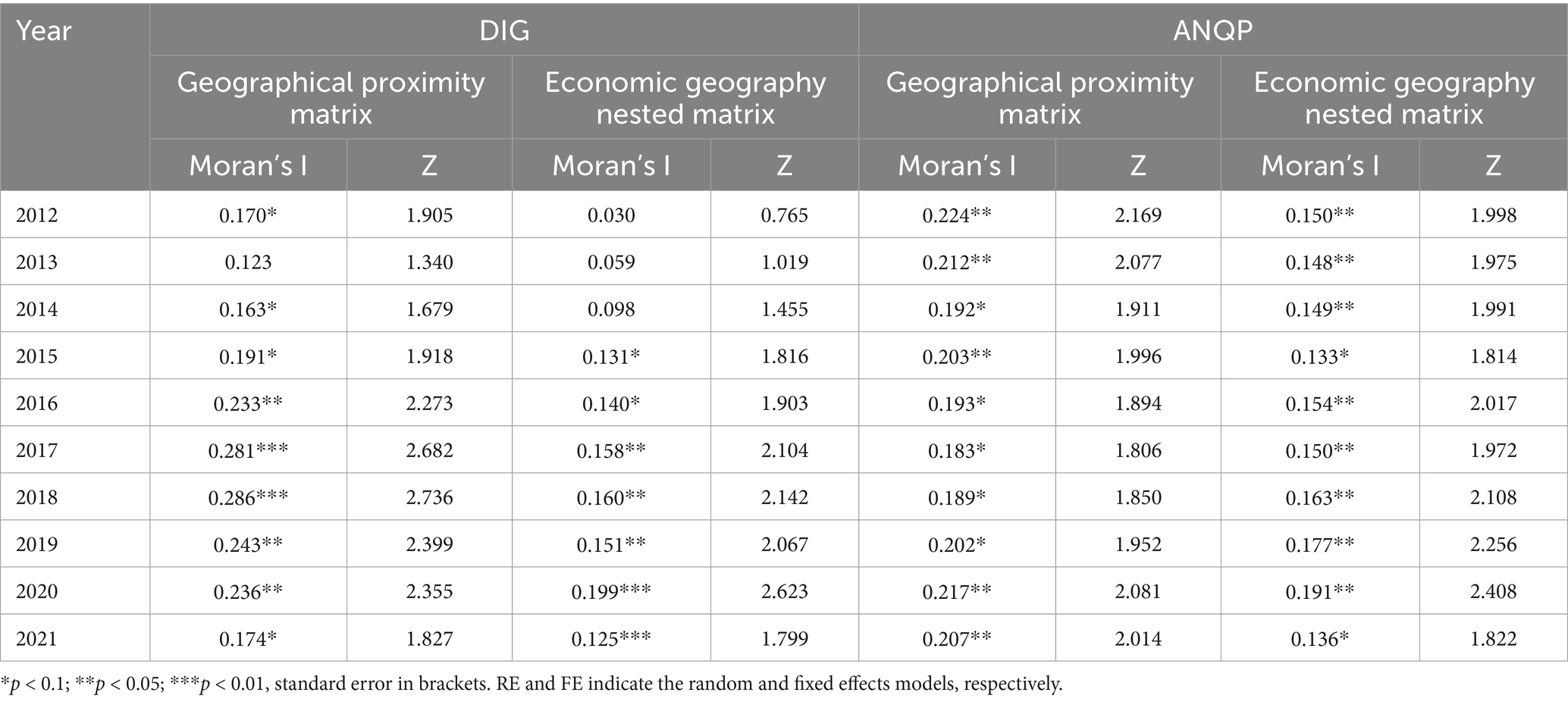
Table 12. Moran’s I statistical values for the digital economy and Agricultural new quality productive forces across the board in China, 2012–2021.
The regression results of the Moran index presented in Table 12 indicate that the digital economy and the agricultural new quality productive forces, assessed through various spatial weight matrices, consistently achieved statistical significance across the years. The degree of spatial agglomeration predominantly exhibits a fluctuating upward trajectory, except for 2021, which may have been influenced by the repercussions of the COVID-19 pandemic, leading to variations in the Moran index. The digital economy and the agricultural new quality productive forces in China exhibit notable geographic autocorrelation characteristics throughout the study period. This paper presents the Moran scatterplot of the digital economy and agricultural new quality productive forces for the years 2012 and 2021, utilising a geographic neighbourhood matrix to illustrate the autocorrelation change characteristics of the situation. Figures 4, 5 illustrate the Moran scatter plot.
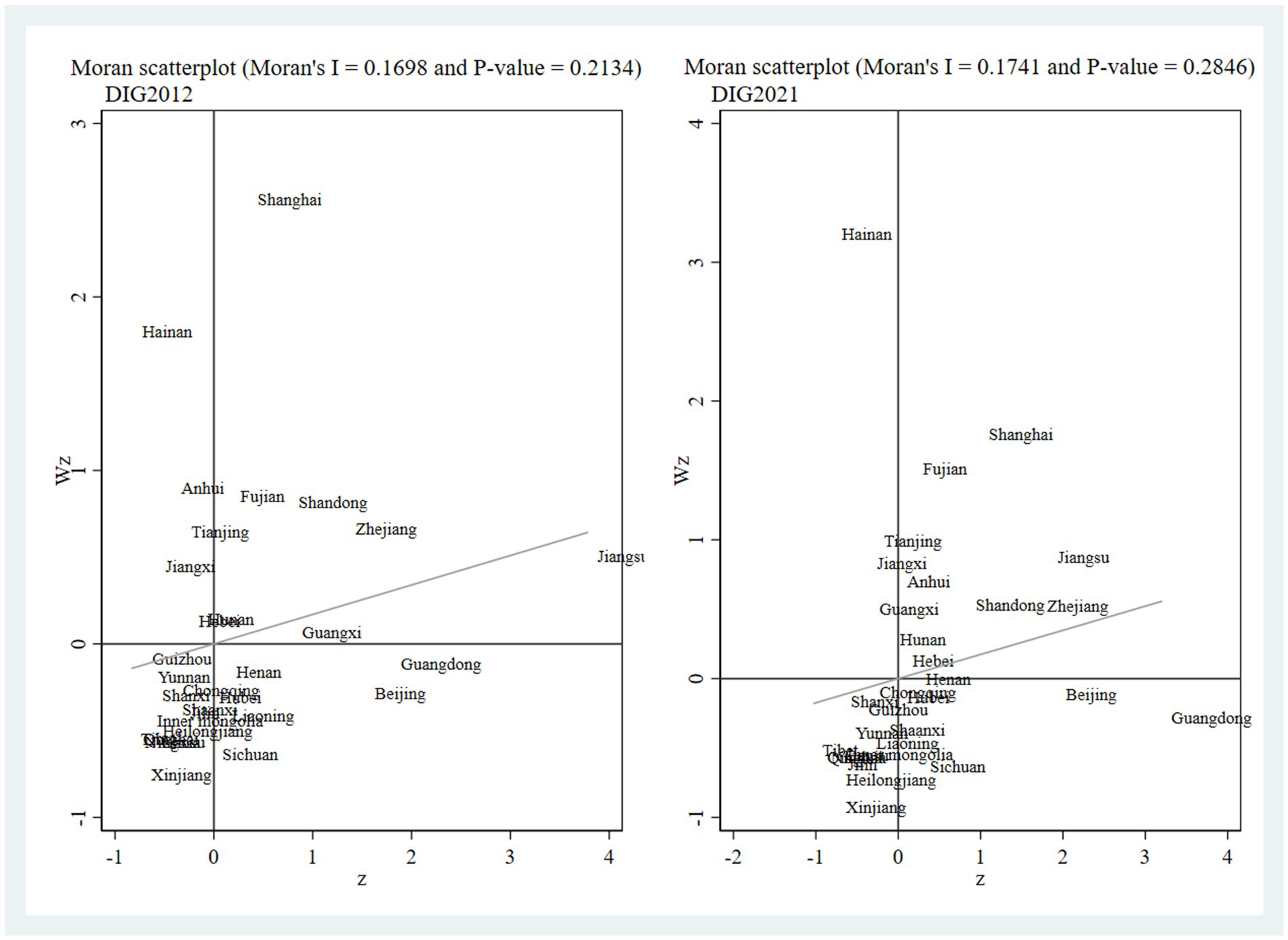
Figure 4. Moran scatterplot of the digital economy in 2012 and 2021. The Moran scatter plot of the Digital economy indicates that the spatial agglomeration pattern of China’s Digital economy is predominantly characterised by ‘high-high’ and ‘low-low’ agglomerations. The likelihood of the central provinces experiencing a significant advancement in the digital economy surpasses that of the western region; for instance, Hunan and Anhui transitioned to a ‘high-high’ agglomeration area in 2021, while the western provinces remain characterised by a ‘low-low’ agglomeration pattern. In a word, the advancement of China’s digital economy exhibits a significant spatial agglomeration effect.
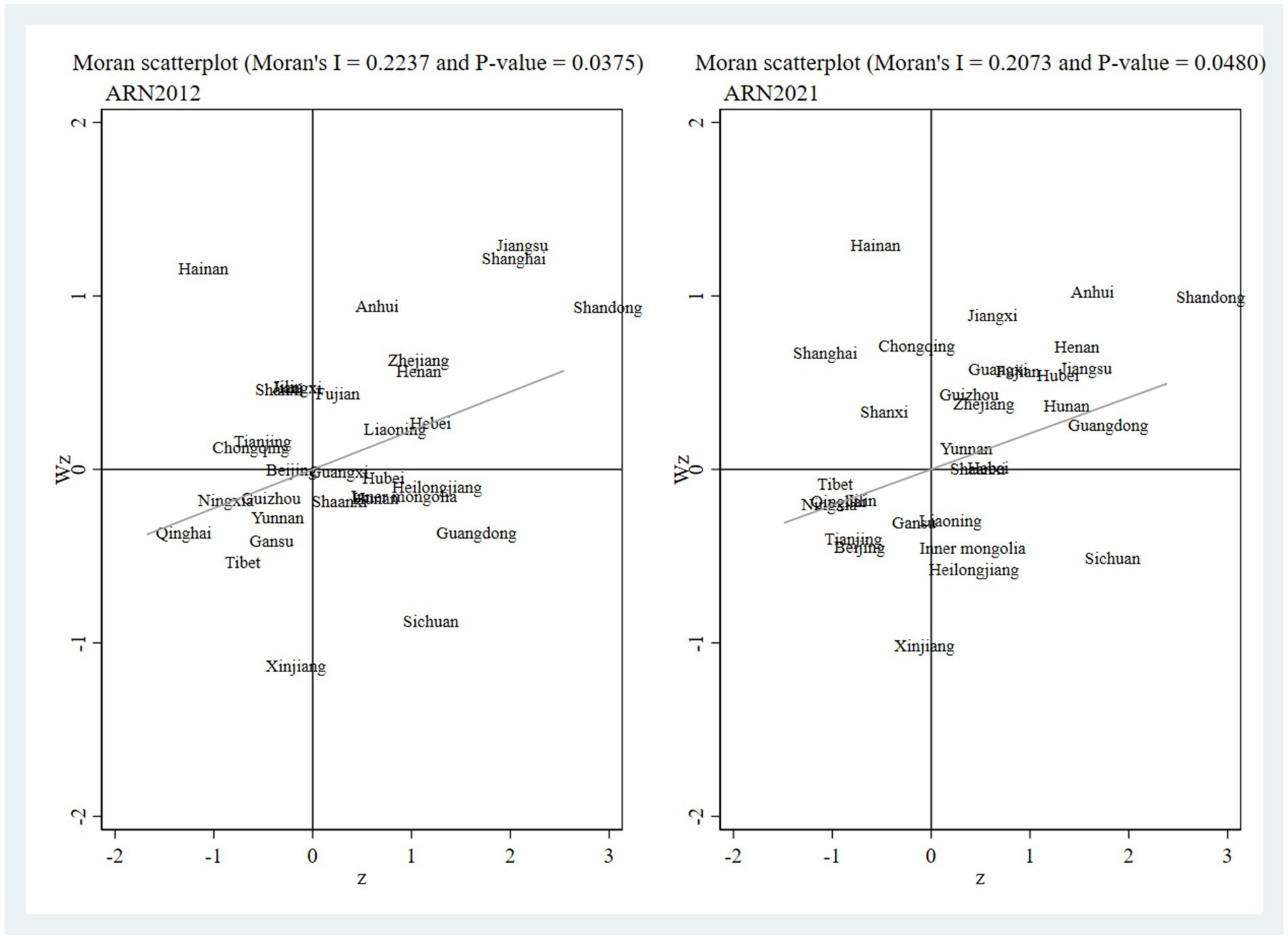
Figure 5. Moran scatter chart of agricultural new quality productive forces in 2012 and 2021. The Moran scatter plot of agricultural new quality productive forces shows that in 2012, the spatial agglomeration pattern of China’s agricultural new quality productive forces was relatively balanced, with only a slight difference in the number of provinces agglomerating in the four quadrants. From the analysis of the results of the Moran scatter plot in 2021, the ‘high-high’ agglomeration area is mainly concentrated in the eastern and central provinces, and some western provinces have jumped from the ‘low-low’ agglomeration area to the ‘high-high’ agglomeration area, such as Guizhou and Yunnan provinces.
5.2.2 Spatial econometric model selection and regression analysis
The previous Moran index has demonstrated that the digital economy and agricultural new quality productive forces exhibit substantial spatial autocorrelation. Consequently, this paper will conduct LM, LR, and Wald tests to identify the appropriate spatial econometric models and select the corresponding fixed effects through a joint significance test. Tests utilising the geographic neighbourhood matrix indicated that the spatial autoregressive model (SAR) with two-way fixed effects achieved statistical significance; tests employing the economic-geographic nested matrix revealed that the spatial Durbin model (SDM) with two-way fixed effects also attained statistical significance, thereby refuting the initial hypotheses that the spatial Durbin model collapses into a spatial autoregressive model and a spatial error model. Therefore, this paper reports the spatial spillover effect results of SAR and SDM models during the decomposition of the spatial spillover effect.
This study discusses the partial differentiation method for the unbiased analysis of SAR and SDM model outcomes, dividing them into direct, indirect, and total effects. This method can better represent the digital economy’s influence on agricultural new quality productive forces. The direct effect refers to the impact of the development of the local digital economy on the local agricultural new quality productive forces, and the indirect effect refers to the impact of the development of the digital economy in neighbouring areas on the local agricultural new quality productive forces, that is, the spatial spillover effect. Tables 13, 14 illustrate the exact outcomes.
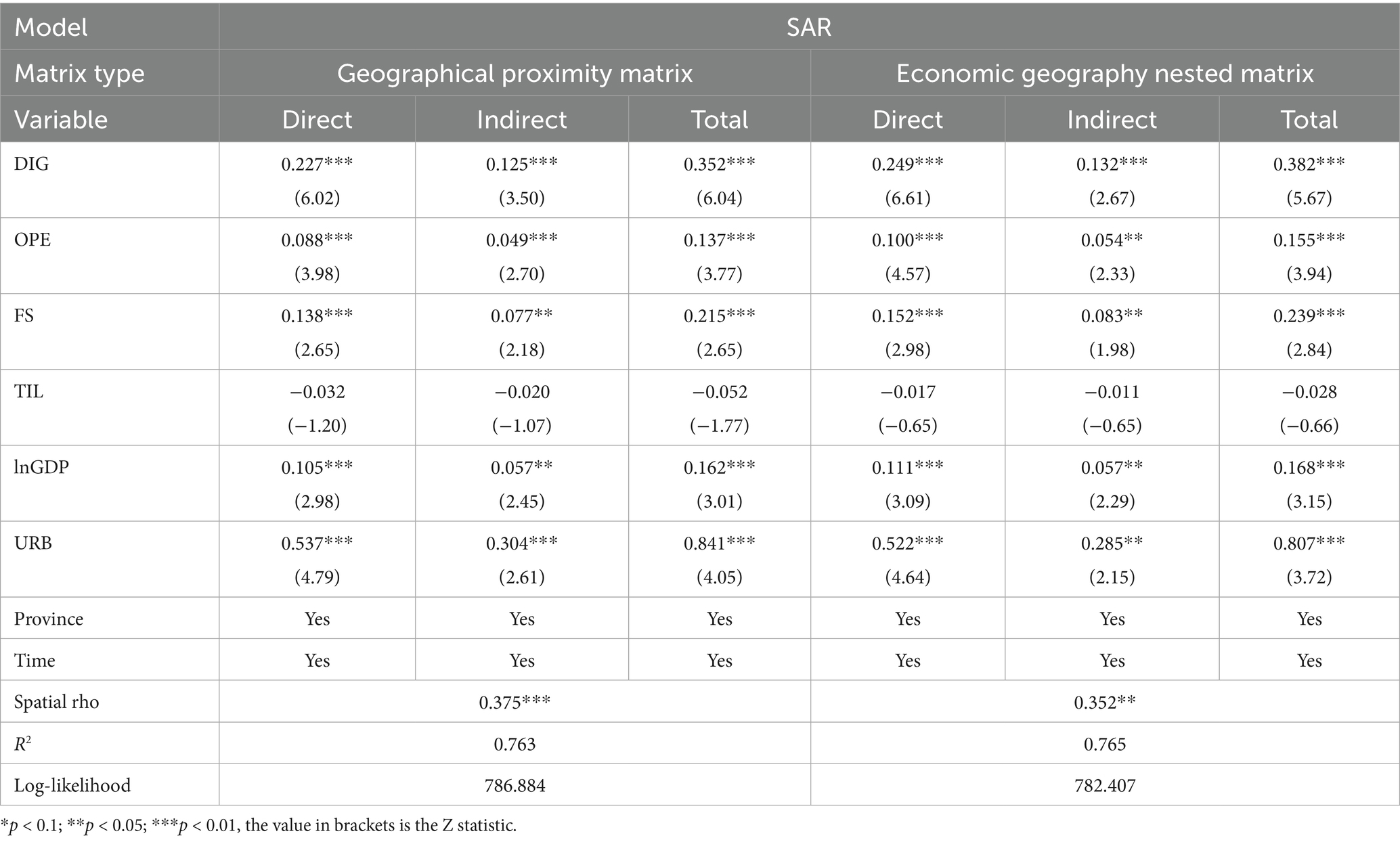
Table 13. Spatial spillover effect (SAR) model of the digital economy on agricultural new quality productive forces.
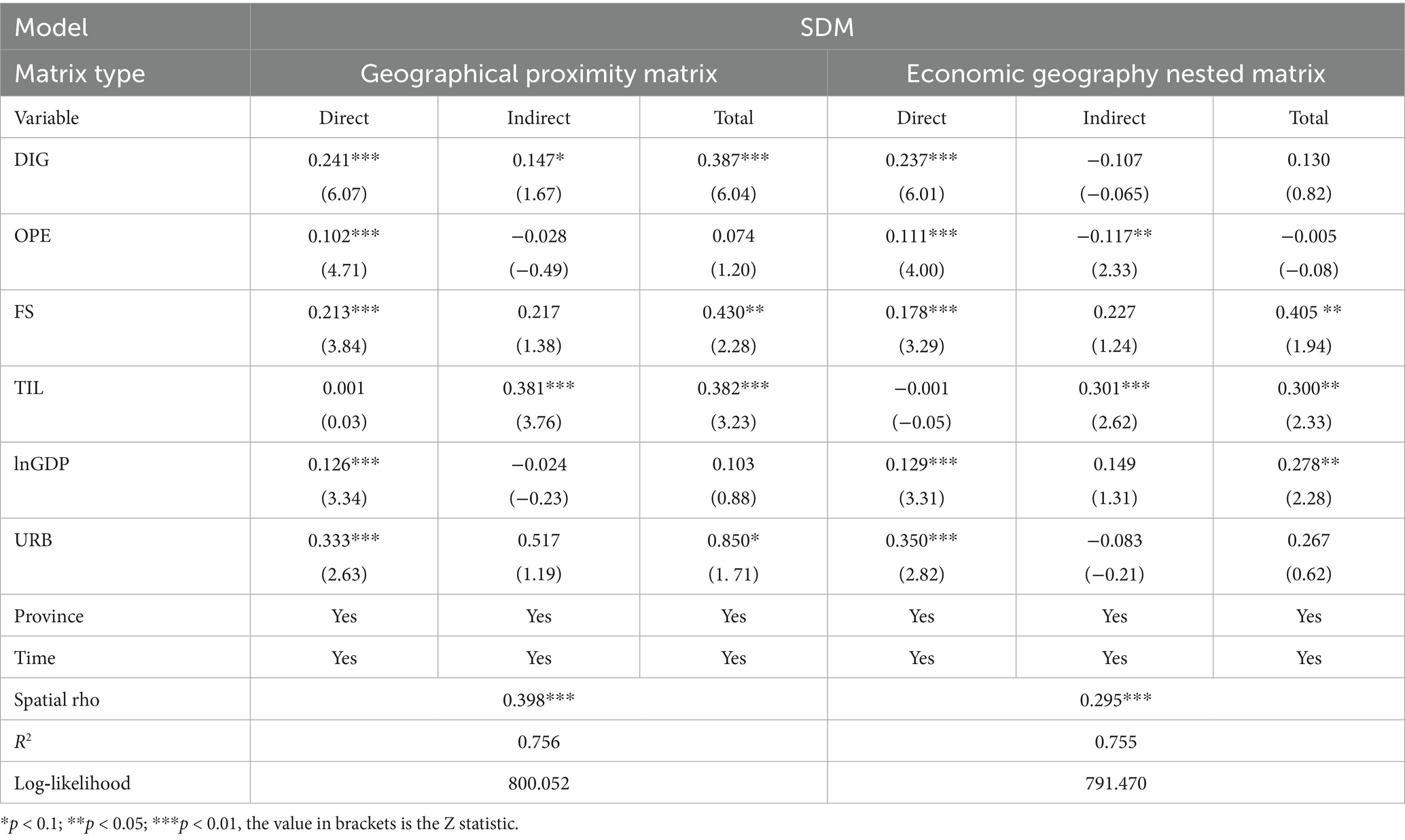
Table 14. Spatial spillover effect (SDM) model of the digital economy on agricultural new quality productive forces.
The findings of spatial spillover effects presented in Table 13 indicate that the direct impact of the digital economy on the agricultural new quality productive forces is statistically significant at the 1% level, regardless of whether assessed through the geographic neighbourhood matrix or the economic-geographic nested matrix. Furthermore, the indirect effect also achieves significance at the 1% level, with coefficients of 0.125 and 0.132, respectively. We looked more closely at the SDM model’s spatial spillover results in Table 14 and found that the direct effects of the digital economy based on the SDM model all passed the 1% significance test. The direct effects based on the geographic neighbourhood matrix also passed the 10% significance test. The empirical results indicate that the digital economy exerts a substantial regional spillover effect on the agricultural new quality productive forces. The advancement of the digital economy will not only foster the emergence of new quality productive forces in local agriculture but also stimulate the development and progress of such forces in adjacent regions.
Based on this, hypothesis H4 is valid: The digital economy has a spatial spillover effect on generating agricultural new quality productive forces.
6 Discussion, conclusions of the study and recommendations for countermeasures
6.1 Discussion
This study quantifies the digital economy and the agricultural new quality productive forces using the entropy approach, confirming a consistent increase in both (Zhang and Jiang, 2024; Jin and Qi, 2025), albeit with notable disparities. In particular, the digital economy exhibits a decreasing pattern of “east-centre-west-north-east,” which is generally in line with the findings of existing academics (Jin and Qi, 2025). On the one hand, the eastern region has a substantial advantage in constructing digital infrastructure and recruiting high-end talent due to its first-mover advantage in market-oriented reforms. The central and western regions are experiencing a sluggish pace of development. On the other hand, the central region receives industrial transfers from the eastern region, while infrastructure constraints and geographic location exacerbate the digital divide in the west. The development of agricultural new quality productive forces exhibits a decreasing pattern of “centre - east - west - north-east,” which follows the findings of existing academicians (Wu, 2025). There are five core grain-producing areas in the country’s central region, and the agricultural total factor productivity of the region is substantially higher than that of the country due to the construction of high-quality farmland. Although the eastern region has a first-mover advantage in applying digital technology, the constraints of arable land resources have resulted in “high and stagnant” agricultural new quality productive forces. Its geographical environment and inadequate infrastructure limit the region’s development in the West. In contrast, the northeastern region relies on the conventional heavy industry route, which has delayed the development of new, high-quality productive forces in agriculture.
In this study, the influence of the digital economy on agricultural new quality productive forces is demonstrated in an overall trend that is most pronounced in the centre, second most pronounced in the west, and weakest in the east and northeast. Wu Xiaojun’s discovery of the most excellent overall posture in the west, the second strongest in the east, and the weakest in the centre are partially at odds with this discovery. The aforementioned scenario arises from discrepancies in formulating indicators for agricultural new quality productive forces. Wu Xiaojun’s indicators focus on three aspects: the quality of labourers, the upgrading of labour means, and the objects of labour. A stronger role of the digital economy in agricultural new quality productive forces in the Western region has been achieved due to the rapid diffusion of digital equipment, strong policy support, and low labour costs. So, the marginal benefit is greater in the short run. However, in this research, the first-level indicator of agricultural green productivity is included separately in addition to the aforementioned three dimensions when constructing agricultural new quality productive forces. The central region is a significant food-producing area, and the ecological and recycling agriculture models are well-established. The digital economy is more closely integrated with green technology, which increases the overall score of the central region by performing better in the green dimension. Consequently, the digital economy plays a more significant role in developing agricultural new quality productive forces in the central region.
The non-linear threshold effect of the digital economy on agricultural new quality productive forces is consistent with the existing literature’s findings (Wen et al., 2025). The digital economy can effectively promote the development of new, high-quality, productive forces in agriculture during its primary stage of development. However, the “syphon effect” of the digital economy will drain the agricultural sector’s factors during the growth stage, thereby inhibiting the development of new, high-quality productive forces. Ultimately, the digital economy has entered the maturity stage, promoting the agricultural industry’s transformation. The experience and model of digital agricultural production have been widely promoted, and the development of the digital economy once again has a positive impact on the emergence of new quality productive forces in agriculture.
6.2 Conclusion
Firstly, the digital economy in China experienced a constant increase from 0.0746 to 0.1758 between 2012 and 2021, while the agricultural new quality productive forces increased from 0.1618 to 0.2729. This paper suggests that the digital economy and agricultural new quality productive forces are rising. Specifically, the digital economy is most developed in Guangdong Province and least developed in Tibet. The remaining 29 provinces, excluding Guangxi and Tibet, exhibit an upward trend compared to 2012. Guizhou Province has the most significant increase. The digital economy’s development is characterised by stark geographic disparities, with the East being the most advanced, the centre being the second most advanced, and the West and North-East catching up. Shandong Province has the most developed agricultural new quality productive forces, while Shanghai has the least. Furthermore, the agricultural new quality productive forces in all 30 provinces of China, except for Shanghai, showed an upward trend compared to 2012. Agricultural new quality productive forces exhibit a decreasing development pattern, characterised by a “centre - east - west - north-east” sequence, with relatively minor geographical differences.
Secondly, the digital economy can enhance the agricultural new quality productive forces, and this finding remains solid following tests such as the introduction of instrumental variables and the substitution of the endogeneity test model. The regression results from the analysis of the Digital Economy sub-dimensions indicate that the digital industrialisation dimension has the most significant impact on the agricultural new quality productive forces. The impact of the digital economy on the agricultural new quality productive forces has greater geographical variation, being more significant in the central and western areas while having a minimal effect in the eastern and northeastern regions.
Thirdly, agricultural technological progress mediates between the digital economy and the agricultural new quality productive forces. The trajectory is the digital economy - agricultural technological advancement - agriculture new quality productive forces. The digital economy has facilitated the movement of agricultural resources beyond spatial limitations, enhanced the allocation efficiency of agricultural factors, achieved advancements in agricultural technology, and fostered the emergence of agricultural new quality productive forces.
Fourthly, the digital economy exerts a non-linear threshold influence on the agricultural new quality productive forces. Articulated as a ‘facilitating-inhibiting-facilitating’ impact mechanism. Specifically, In the nascent phase of the digital economy, the digital economy dividend is realised through the advancement of digital infrastructure, hence facilitating the emergence of new quality productive forces in agriculture. Entering the growth stage of the digital economy, the “siphon effect” of the development of the digital economy appears, and the digital economy inhibits the generation of agricultural new quality productive forces. Finally, the development of the digital economy has entered a relatively stable and mature stage. The digital economy enhances the advancement of the agricultural sector, while its expansion fosters the emergence of new quality productive forces in agriculture.
Fifthly, the digital economy has a spatial spillover effect on agricultural new quality productive forces. The development of the digital economy in neighbouring areas will affect the development of local agricultural new quality productivity forces.
6.3 Recommendation
The article proposes four policy recommendations based on these findings:
Initially, the digital economy must be enhanced and supported in its development. The government should further augment its support for developing the digital economy. In addition to promoting the digital economy in developed areas of digital progress, it is crucial to consider the central and western regions to provide policies, talents, projects, and other support elements that will reduce the regional disparities in the development of the digital economy. Encourage the advancement of the digital economy in the central and western regions to facilitate the digital transformation and modernisation of local industries and foster the creation of new, high-quality productive forces in agriculture.
Secondly, the focus should be on rural areas, and digital infrastructure construction should be expedited. Accelerating the construction of digital villages, enabling the upgrading of local agricultural industries, cultivating digital talents, constructing digital bases, and establishing the groundwork for the consolidation of the digital economy to empower new, high-quality agricultural productive forces. Then, to enhance the digital transformation and upgrading of industries, promote the integration of the digital economy and the real economy, consolidate the construction of digital infrastructure, work to promote Internet talents and digital platforms to the countryside, strengthen the application of the digital economy throughout the entire agricultural production chain, realise the transformation of traditional agriculture to digital agriculture, and establish a modernised digital agricultural production and management system.
Thirdly, local governments must contribute to advancements in agricultural technology and facilitate the transmission-to-intermediation effect. The digital economy is crucial for technological advancement in agriculture and the evolution of agricultural new quality productive forces in the sector. In light of the ongoing advancement of the digital economy and the extensive application of digital technologies in agriculture, the innovative agricultural model, smart farms, and modern mechanised production establish a novel agricultural development paradigm, resulting in new qualitative productive forces in agriculture.
Fourthly, the Government should leverage the spatial spillover effects of digital economic development to foster coordinated regional growth and stimulate the emergence of high-quality agricultural productive forces in adjacent areas. Strengthen exchanges and learning between regions with high and low levels of the digital economy, establish a mechanism for exchanges between neighbouring regions in the development of the digital economy, and assist regions with low levels of the digital economy in transferring digital technology from regions with high levels of the digital economy. Enhance and establish interregional assistance mechanisms to fully leverage the spatial spillover effect of the digital economy.
Data availability statement
The raw data supporting the conclusions of this article will be made available by the authors, without undue reservation.
Author contributions
CF: Software, Methodology, Investigation, Formal analysis, Writing – original draft, Validation, Data curation, Project administration, Conceptualization. ZJ: Formal analysis, Project administration, Validation, Data curation, Investigation, Writing – original draft, Software, Conceptualization, Methodology. YZha: Formal analysis, Software, Data curation, Writing – original draft, Conceptualization, Methodology, Validation, Investigation. XL: Writing – review & editing, Supervision, Visualization. YZhu: Supervision, Writing – review & editing, Visualization. BL: Funding acquisition, Writing – review & editing.
Funding
The author(s) declare that financial support was received for the research and/or publication of this article. This work was supported by the Jiangxi Province Industrial Economy System Industrial Integration Post Project (JXARS-16) and Jiangxi Province Philosophy and Social Science Key Research Base Project (23ZXSKJD14).
Acknowledgments
The authors are grateful to the editor and the reviewers of this paper.
Conflict of interest
The authors declare that the research was conducted in the absence of any commercial or financial relationships that could be construed as a potential conflict of interest.
Correction note
A correction has been made to this article. Details can be found at: 10.3389/fsufs.2025.1679478.
Generative AI statement
The authors declare that no Gen AI was used in the creation of this manuscript.
Publisher’s note
All claims expressed in this article are solely those of the authors and do not necessarily represent those of their affiliated organizations, or those of the publisher, the editors and the reviewers. Any product that may be evaluated in this article, or claim that may be made by its manufacturer, is not guaranteed or endorsed by the publisher.
References
Barata, A. (2019). Strengthening national economic growth and equitable income through sharia digital economy in Indonesia. J. Islam. Monet. Econ. Finance. 5, 145–168. doi: 10.21098/jimf.v5i1.1053
Chen, Y. (2021). Mechanism innovation for the integrated development of digital economy and rural industry. Issues in Agricultural Economy., 81–91.
Chen, X., Chen, X., Chen, X., and Chen, X. (2022). Theoretical framework and research prospect of digital economy. J. Manag. World 38, 208–224, 13–16. doi: 10.19744/j.cnki.11-1235/f.2022.0020
Chen, A., He, H., Wang, J., Li, M., Guan, Q., and Hao, J. (2019). A study on the arable land demand for food security in China. Sustain. For. 11:4769. doi: 10.3390/su11174769
Chen, Y., Wang, X.-w., and Zhang, G.-x. (2021). Threshold effect of transportation infrastructure on rural poverty reduction. J. China Univ. Geosci. 21, 110–123. doi: 10.16493/j.cnki.42-1627/c.2021.05.010
Ding, B., Zhao, Y., and Deng, J. (2022). Calculation, decoupling effects and driving factors of carbon emission from planting industry in China. Chin. J. Agric. Resour. Reg. Plan. 43, 1–11.
Gao, D., and Lyu, X. (2023). Agricultural total factor productivity, digital economy and agricultural high-quality development. PLoS One 18:e0292001. doi: 10.1371/journal.pone.0292001
Ge, T., and Xun, Z. (2022). Digital economy, non-agricultural employment, and division of labor. J. Management World. 38:311, 72–84. doi: 10.19744/j.cnki.11-1235/f.2022.0069
Guo, C., and Miao, Y. (2023). The mechanism and pathways of digital economy promoting the rural industries rivitalization. J. Beijing University Technol. 23, 98–108.
Hansen, B. E. (1999). Threshold effects in non-dynamic panels: estimation, testing, and inference. J. Econ. 93, 345–368. doi: 10.1016/S0304-4076(99)00025-1
He, L., Wang, F., and Wang, C. (2022). How will the digital economy drive China’s rural revitalization? Inquiry Economic Issues., 1–18.
He, Z., Zhang, X., and Wan, G. (2020). Digital finance, digital divide, and multidimensional poverty. Stat. Res. 37, 79–89. doi: 10.19343/j.cnki.11-1302/c.2020.10.007
Hu, X., Xiao, B., and Tong, Z. (2024). Technological integration and obstacles in China’s agricultural extension systems: a study on disembeddedness and adaptation. Sustain. For. 16:859. doi: 10.3390/su16020859
Hua-hua, X., Shen, Y., Zhang, H., and Guo, F. (2018). Can digital finance boost entrepreneurship? Evidence from China. China Econ. Q. 17, 1557–1580. doi: 10.13821/j.cnki.ceq.2018.03.12
Huang, Y., Gong, S., Zou, C., Jia, L., and Xu, Z. (2022). Digital economy, factor allocation efficiency, and integrated urban-rural development. Chin. Popul. Resour. Environ. 32, 77–87.
Huang, Q.-h., and Sheng, F.-f. (2024). New productive forces system: factor characteristics, structural bearing and functional orientation. Reformation, 15–24.
International Labour Organization (2021). The role of digital labour platforms in transforming the world of work. World Employ. Soc. Outlook.
Ji, Z. (2021). Spatial differences and driving mechanism of high quality development in China’s agriculture and rural areas. J. Quantitative Technological Econom. 38, 25–44. doi: 10.13653/j.cnki.jqte.2021.12.001
Jiang, T. (2022). Mediating effects and moderating effects in causal inference. China Industrial Economics., 100–120. doi: 10.19581/j.cnki.ciejournal.2022.05.005
Jin, S., and Qi, X. (2025). China’s agricultural new quality productivity: comprehensive measurement and dynamic evolution. J. Macro Quality Research.
Kang, J., and Qirui, G. (2024). A study on the impact of digital inclusive finance on new agricultural productive forces. J. Central China Normal Univ. 63, 1–13. doi: 10.19992/j.cnki.1000-2456.2024.04.001
Kong, F., Cheng, W., and Xu, C. (2023). Does the development of digital economy improve the value transformation efficiency of forest ecological products: an empirical analysis in Lishui, Zhejiang Province. Chinese Rural Economy., 163–184. doi: 10.20077/j.cnki.11-1262/f.2023.05.009
Li, W., Cui, W., and Yi, P. (2024). Digital economy evaluation, regional differences and spatio-temporal evolution: case study of Yangtze River economic belt in China. Sustain. Cities Soc. 113:105685. doi: 10.1016/j.scs.2024.105685
Li, H., Lin, Q., Wang, Y., and Mao, S. (2023). Can digital finance improve China’s agricultural green total factor productivity? Agriculture 13:1429. doi: 10.3390/agriculture13071429
Li, S., Xue, F., and Jiang, J. (2024). Effect of agricultural digitization on new productive forces of food in China. J Agro-Forestry Economics Management. 23, 435–445. doi: 10.16195/j.cnki.cn36-1328/f.2024.04.46
Li, Z., and Yang, Q. (2021). How does digital economy affect the high-quality development of China’s economy? Mod. Econ. Res., 10–19. doi: 10.13891/j.cnki.mer.2021.07.003
Liu, C. (2023). The mechanism and practical path of subversive agricultural technology promoting agricultural modernization. Study Exploration, 141–146.
Liu, J., and Wang, X. (2025). Exploring the driving effect of the digital economy on rural labor force’s occupational transformation: based on analysis of CFPS panel data. Int. Rev. Financ. Anal. 101:104010. doi: 10.1016/j.irfa.2025.104010
Luo, B., and Geng, P. (2024). New quality agricultural productivity: theoretical framework, core concepts, and enhancement pathways. Issues Agricultural Economy., 13–26. doi: 10.13246/j.cnki.iae.2024.04.010
Ma, X., and Yang, X. (2024). Promoting high-quality agricultural development by accelerating the formation of new quality productivity. Issues Agricultural Economy., 4–12. doi: 10.13246/j.cnki.iae.2024.04.009
Ma, D., and Zhu, Q. (2022). Innovation in emerging economies: research on the digital economy driving high-quality green development. J. Bus. Res. 145, 801–813. doi: 10.1016/j.jbusres.2022.03.041
Qi, Y.-d., Ding, S.-l., and Liu, C.-h. (2021). The development of new occupation and the construction of new labor relations in the era of digital economy. Reformation, 65–81.
Song, Z., Leng, M., Zhou, B., and Gao, X. (2024). New quality agricultural productive forces in China: evaluation system construction, dynamic evolution and policy implications. J. Agro Forestry Economics Manag. 23, 425–434. doi: 10.16195/j.cnki.cn36-1328/f.2024.04.45
Su, F., Liu, Y., Wang, S., and Shang, H. (2022). Impact of climate change on food security in different grain producing areas in China. China Popul. Resour. Environ. 32, 140–152.
Tan, L., Yang, Z., Irfan, M., Ding, C. J., Hu, M., and Hu, J. (2024). Toward low-carbon sustainable development: exploring the impact of digital economy development and industrial restructuring. Bus. Strategy Environ. 33, 2159–2172. doi: 10.1002/bse.3584
Tao, T., Fan, K.-x., and Zhu, Z.-y. (2022). Digital rural construction and the upgrading of county industrial structure——quasi-natural experiment based on the policy of E-commerce penetration in rural comprehensive demonstration counties. China Business and Market. 36, 3–13. doi: 10.14089/j.cnki.cn11-3664/f.2022.05.001
Tian, Y., Cai, Y., and Zhang, H. (2024). The impact of digital economy on agricultural carbon emission efficiency: based on threshold effect and spatial spillover effect test. J Agrotech Econ, 89–107. doi: 10.13246/j.cnki.jae.20240522.001
Wang, X.-l., and Li, X. (2024). The theoretical logic and path selection of digital intelligence technology enabling the cultivation of new quality agricultural productive force-analysis based on Marxist productivity theory. J. Northwest Univ. 54, 17–27. doi: 10.16152/j.cnki.xdxbsk.2024-05-002
Wang, Q.-m., and Yang, J.-g. (2023). Research on digital new quality productivity and high-quality development of Chinese agriculture. J. Shaanxi Normal Univ. 52, 61–72. doi: 10.15983/j.cnki.sxss.2023.1003
Wang, J., Zhu, J., and Luo, X. (2021). Research on the measurement of China’s digital economy development and the characteristics. J. Quantitative Technological Economics. 38, 26–42. doi: 10.13653/j.cnki.jqte.2021.07.002
Wen, T., and Chen, Y. (2020). Research on the digital economy and agriculture and rural economy integration: practice pattern, realistic obstacles and breakthrough paths. Issues Agricultural Economy, 118–129. doi: 10.13246/j.cnki.iae.2020.07.011
Wen, R., Li, Y., and Zhang, J. (2025). The empowerment of agricultural new quality productive forces by digital economy: theoretical mechanisms and empirical verification. Chin. J. Eco-Agric.
Wu, X. (2021). Research on the integrated development of digital economy and rural industry. Southwest Finance, 78–88.
Wu, X. (2025). How does the digital economy empower new quality productive forces? Based on the production relations theory and double machine learning model. Jinan J.
Yang, C., Ji, X., Cheng, C., Liao, S., Obuobi, B., and Zhang, Y. (2024). Digital economy empowers sustainable agriculture: implications for farmers’ adoption of ecological agricultural technologies. Ecol. Indic. 159:111723. doi: 10.1016/j.ecolind.2024.111723
Yang, H., and Jiang, L. (2021). Digital economy, spatial effects and total factor productivity. Stat. Res. 38, 3–15. doi: 10.19343/j.cnki.11-1302/c.2021.04.001
Yang, J., and Wang, Q. (2025). Regional differences and convergence of the development level of new quality productivity in digital agriculture. J. Xi’an University Finance Econom. 38, 43–57. doi: 10.19331/j.cnki.jxufe.20240516.001
Yi, E.-w., Wang, J., and Zhu, J. (2023). Digital economy, resource allocation efficiency and high-quality development of agriculture. Modern Finance Economics J Tianjin University Finance Economics. 43, 20–37. doi: 10.19559/j.cnki.12-1387.2023.12.002
Yin, S., Bai, L., and Zhang, R. (2021). Prevention schemes for future fresh agricultural products (FAPs) supply chain: mathematical model and experience of guaranteeing the supply of FAPs during the COVID -19 pandemic. J. Sci. Food Agric. 101, 6368–6383. doi: 10.1002/jsfa.11308
You, L., and Tian, X.-y. (2024). New quality agricultural productive force: realistic logic, connotation analysis and generation mechanism. On Economic Problems., 27–35. doi: 10.16011/j.cnki.jjwt.2024.06.017
Zhang, Y. (2021). RETRACTED: influence of frequent flood disaster on agricultural productivity of rice planting and structural optimization strategy. Microprocess. Microsyst. 82:103863. doi: 10.1016/j.micpro.2021.103863
Zhang, J., and Jiang, C. (2024). Research on the coupling coordination and interaction between digital economy and environmental performance. Mod. Econ. Res., 35–47. doi: 10.13891/j.cnki.mer.2024.11.013
Zhang, Y.-p., and Luan, J. (2022). Digital economy enables rural revitalization: theoretical mechanism, restrictive factors and implementation path. Reformation, 79–89.
Zhang, Z., Sun, C., and Wang, J. (2023). How can the digital economy promote the integration of rural industries—taking China as an example. Agriculture 13:2023. doi: 10.3390/agriculture13102023
Zhao, W., and Xu, X.-w. (2023). Effect and mechanism of digital economy on the resilience of agricultural economy. J. South China Agricultural Univ. 22, 87–96.
Zhao, T., Zhang, Z., and Liang, S. (2020). Digital economy, entrepreneurship, and high-quality economic development: empirical evidence from urban China. J. Management World. 36, 65–76. doi: 10.19744/j.cnki.11-1235/f.2020.0154
Zhaoan, H., Jingfeng, Z., and Haizhen, W. (2021). A study on the scale measurement, disequilibrium and regional differences of China’s inter-provincial digital economy. J. Quant. Technol. Econ. 38, 164–181. doi: 10.13653/j.cnki.jqte.2021.08.009
Zhong, X. (2023). Coupling synergy measure and spatial-temporal characteristic analysis of high-quality development of rural industries and common affluence. Statist. Decis. 39, 67–72. doi: 10.13546/j.cnki.tjyjc.2023.07.012
Zhou, Z. (2024). Digital technology empowering new quality productive forces in agriculture: mechanisms, challenges, and strategies. J. China Agricultural Univ. 41, 55–70. doi: 10.13240/j.cnki.caujsse.20240724.001
Zhou, W., and Xu, L.-y. (2023). On new quality pr oductivity: connotative char acter istics and impor tant focus. Reformation, 1–13.
Keywords: digital economy, agricultural new quality productive forces, agricultural technological progress, threshold effect, spatial spillover effect
Citation: Feng C, Jiang Z, Zhang Y, Liu X, Zhu Y and Liu B (2025) The impact and mechanism of action of the digital economy on agricultural new quality productive forces: a discussion of the threshold effect and spatial spillover effect. Front. Sustain. Food Syst. 9:1599265. doi: 10.3389/fsufs.2025.1599265
Edited by:
Siphe Zantsi, Agricultural Research Council of South Africa (ARC-SA), South AfricaReviewed by:
Bingnan Guo, Jiangsu University of Science and Technology, ChinaXiaoshi Zhou, China Agricultural University, China
Copyright © 2025 Feng, Jiang, Zhang, Liu, Zhu and Liu. This is an open-access article distributed under the terms of the Creative Commons Attribution License (CC BY). The use, distribution or reproduction in other forums is permitted, provided the original author(s) and the copyright owner(s) are credited and that the original publication in this journal is cited, in accordance with accepted academic practice. No use, distribution or reproduction is permitted which does not comply with these terms.
*Correspondence: Bin Liu, bGl1YmluQGp4YXUuZWR1LmNu
†These authors have contributed equally to this work and share first authorship
 Chao Feng
Chao Feng Zhengzhong Jiang
Zhengzhong Jiang Ying Zhang1†
Ying Zhang1† Xieqihua Liu
Xieqihua Liu Bin Liu
Bin Liu